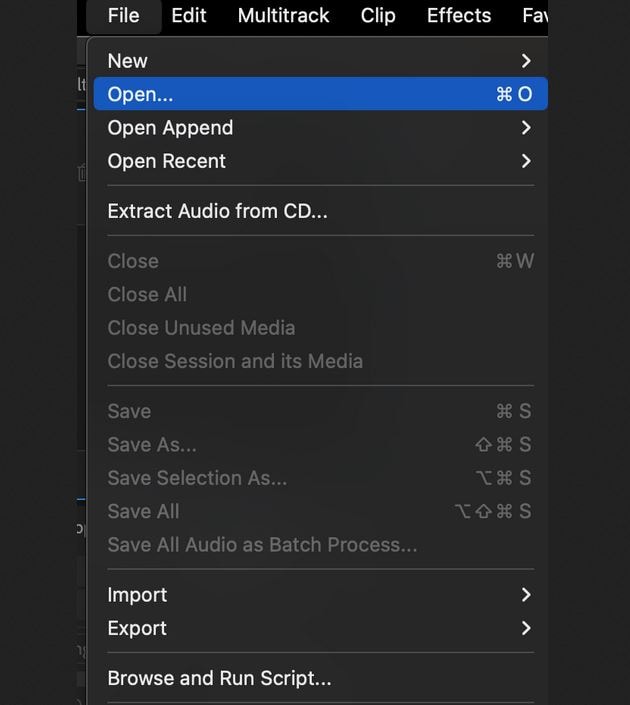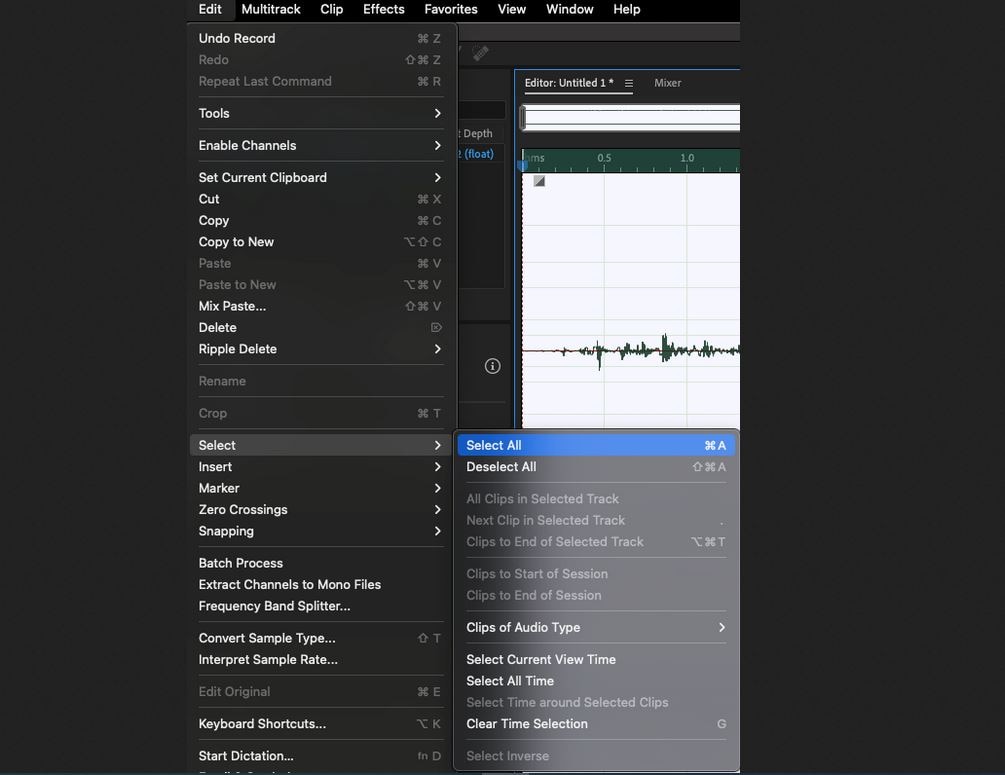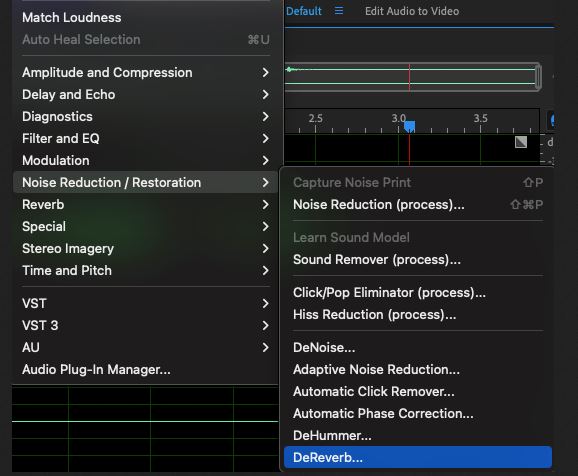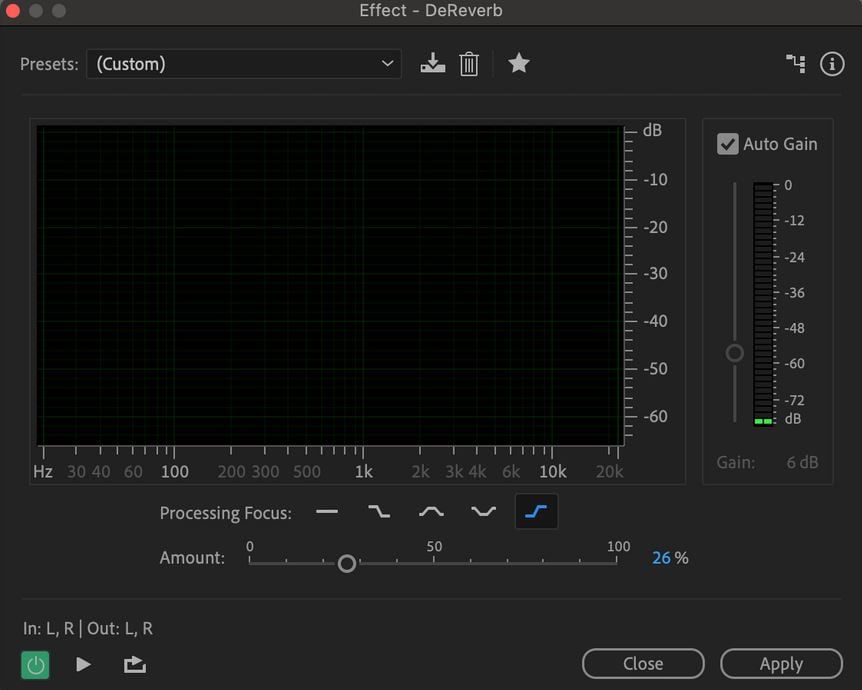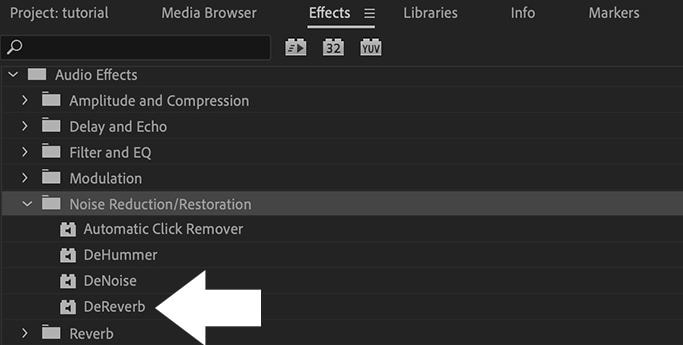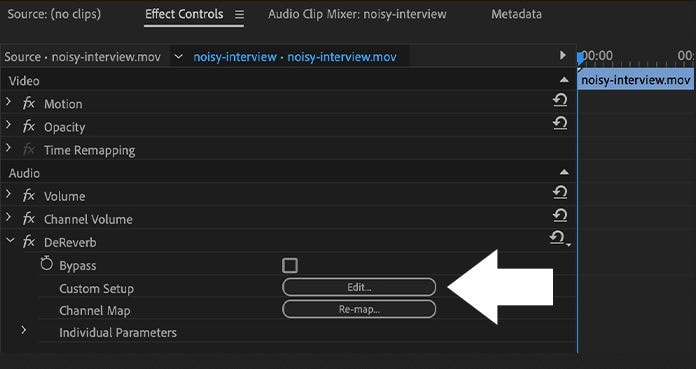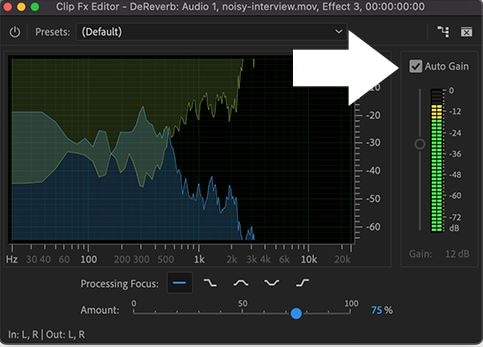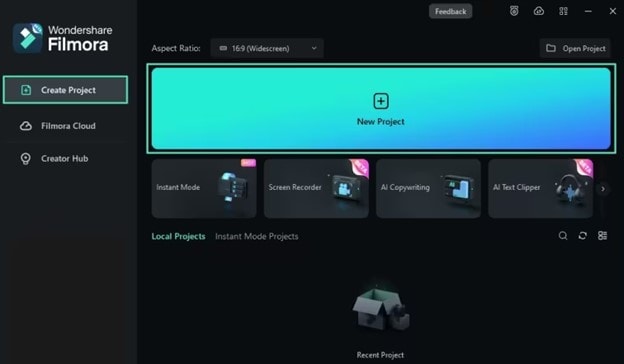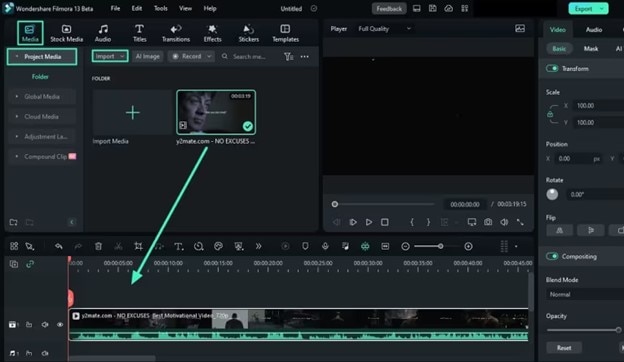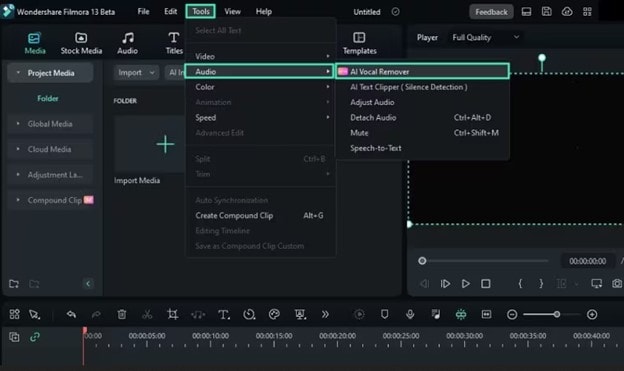:max_bytes(150000):strip_icc():format(webp)/woman-with-remote-cropped-getty-169707531-5b2ebd5943a1030036b1eb56.jpg)
New In 2024, Music Noise Removal With Adobe Audition A Complete Guidebook

Music Noise Removal With Adobe Audition: A Complete Guidebook
With the invention of advanced editing software, the demands of content creation increased. Content creators outrun many challenges to create captivating content. One of these challenges is the maintenance of audio quality. Sometimes, singing a microphone is not enough, so post-creation methods do the trick. One of the ways of doing this is through Adobe Audition noise reduction.
There are multiple things to consider during audio editing at a professional level. For instance, microphone noise, humming, wind, hiss removal, and others. Adobe Audition removes background noises and nuisances that decline audio quality. In this article, you can read about Adobe Audition remove noise methods. In addition, some other tools are discussed for users’ ease and accessibility.
AI Noise Reduction A cross-platform for facilitating your video editing process by offering valuable benefits!
Free Download Free Download Learn More

Part 1: What Do You Know About Background Noise?
Background noise is anything that disturbs the pace of the video and diverts the viewer’s attention. It is the unwanted and unintended sound that takes up your audio. This may include someone chatting in the background, wind noise, and other noises. These factors decline and disrupt the clarity of audio. However, these elements can be managed through various tools and techniques to help creators.
Part 2: How to Remove Noise from Adobe Audition: A Comprehensive Review
Adobe Audition is a tool tailored to assist in audio editing tasks with precision. Users can create, merge, and mix different sound effects and be creative with them. It also has seamless support of Adobe After Effects and Adobe Stock for this purpose. Noise reduction Audition is one of its features that helps in cleaning and enhancing audio. It clears out any unnecessary background noises from any project.
In addition, the tool allows you to manage the audio levels for denoising. Along with manual settings, you can also add denoise effects to reduce background effects. You can manage high and low frequencies in Adobe Audition to remove noise. Upon editing this software, you can review the results afterward.
Different Methods of Audio Reduction in Adobe Audition
As a content creator, you must often manage dialogues and music within a video. Combining both can sometimes get the focus off actual dialogues. This can be due to many reasons; however, the solution is noise reduction in Audition. In this section, you can explore different methods to reduce noise:
1. Noise Reduction Effect
In this section, we are doing a noise reduction Audition manually. The process is straightforward, and here is a step-by-step guide to it:
Step 1: Upon importing your audio in Adobe Audition, navigate towards the top toolbar. Select the “Effects” tab and choose “Noise Reduction/Restoration” from the dropdown menu. As the menu expands further, select “Noise Reduction.”
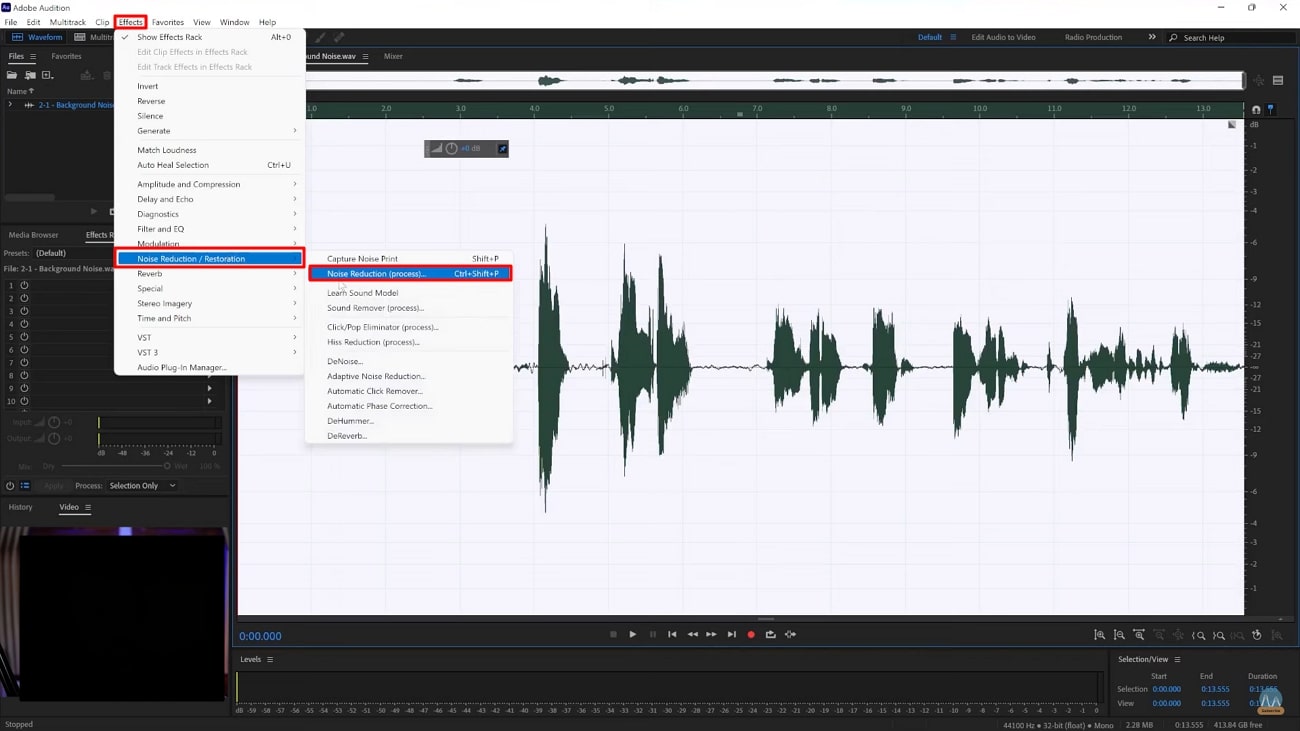
Step 2: This will feature a Noise Reduction window on your screen. In this window, select the “Capture Noise Print” tab and adjust the Noise Reduction slider. Afterwards, press the play button on this window to listen to the audio and select “Apply.”
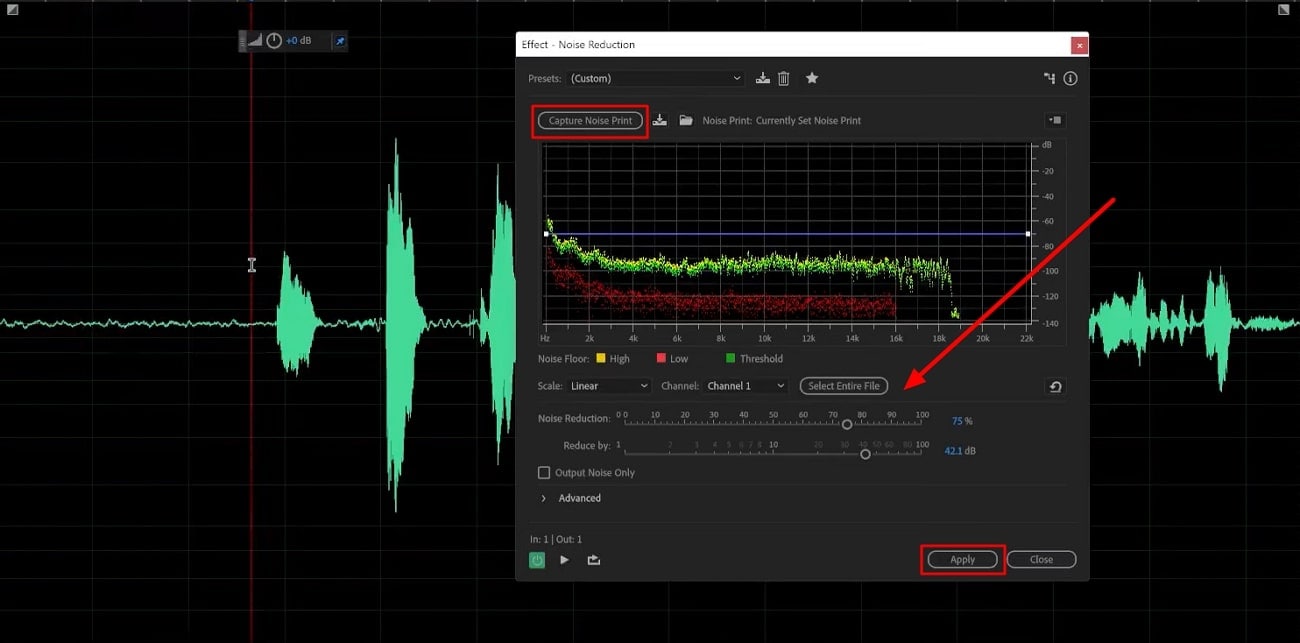
2. DeNoise Effect
This is the second method of Adobe Audition to remove noise. Accessing this option is almost the same, but settings may vary. Here is an instruction manual on how you can denoise in Audition:
Step 1: Once you have imported media into the timeline, reach the upper toolbar. Look for the “Effects” tab and proceed to the “Noise Reduction/Restoration” settings. From the expansion panel, choose the “DeNoise” option.
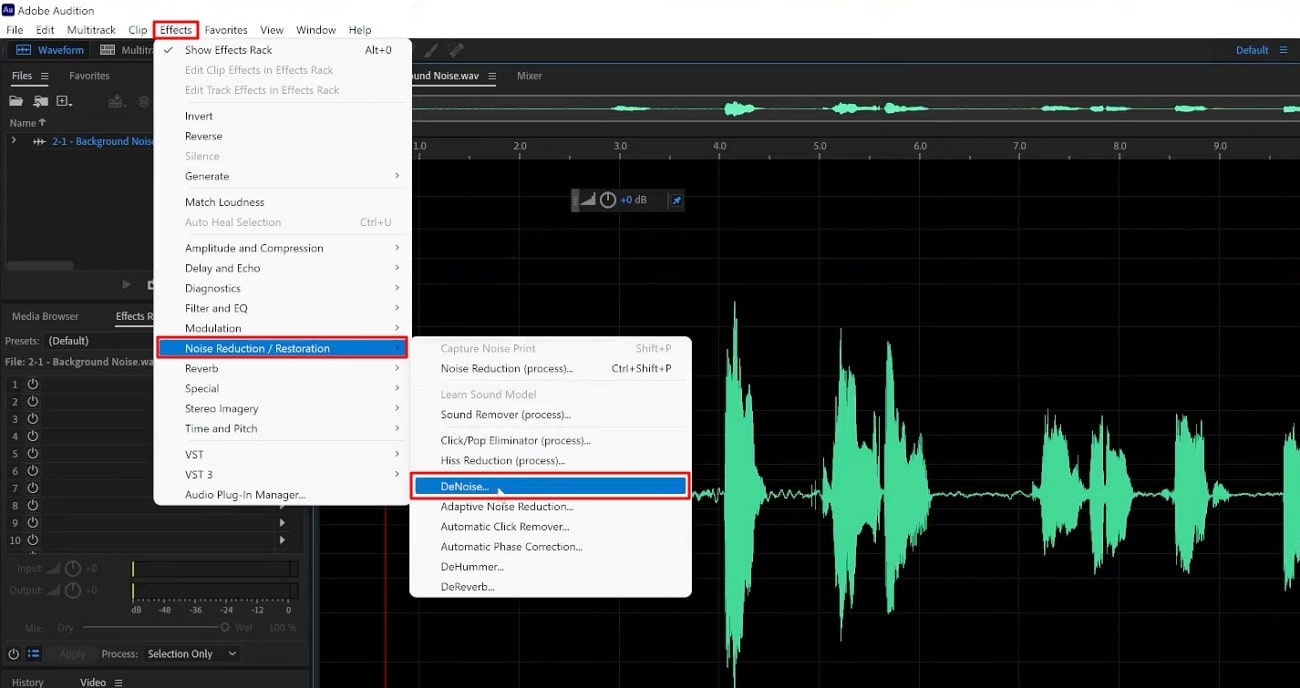
Step 2: After accessing the DeNoise window appearing on the screen, direct towards it. Then, change the position of the “Amount” slider and play your audio. Further, select the “Apply” button to add this effect to your audio.
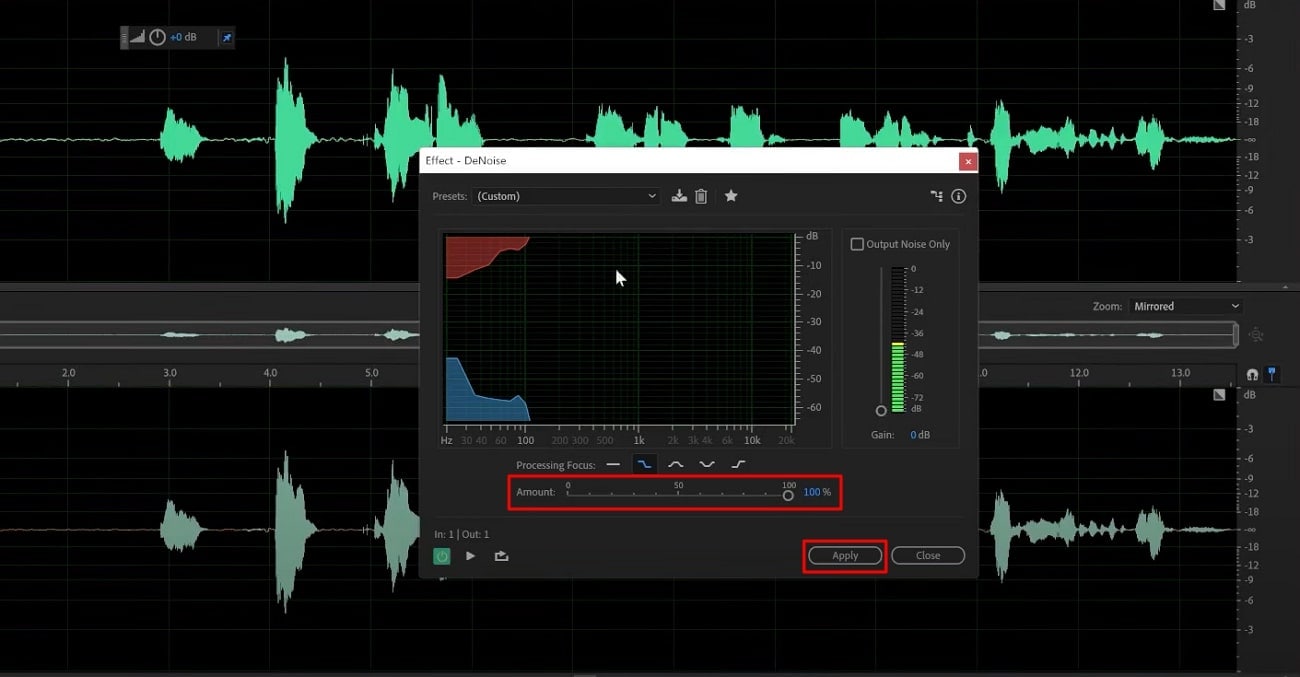
3. Dynamic Effect
Another audio effect that you can apply and adjust in the same manner is the dynamic effect. Follow the steps given below to achieve this effect:
Step 1: After selecting the “Audio” tab, choose “Amplitude and Compression” from the dropdown menu. Expand this option and select “Dynamics” from the expansion menu.
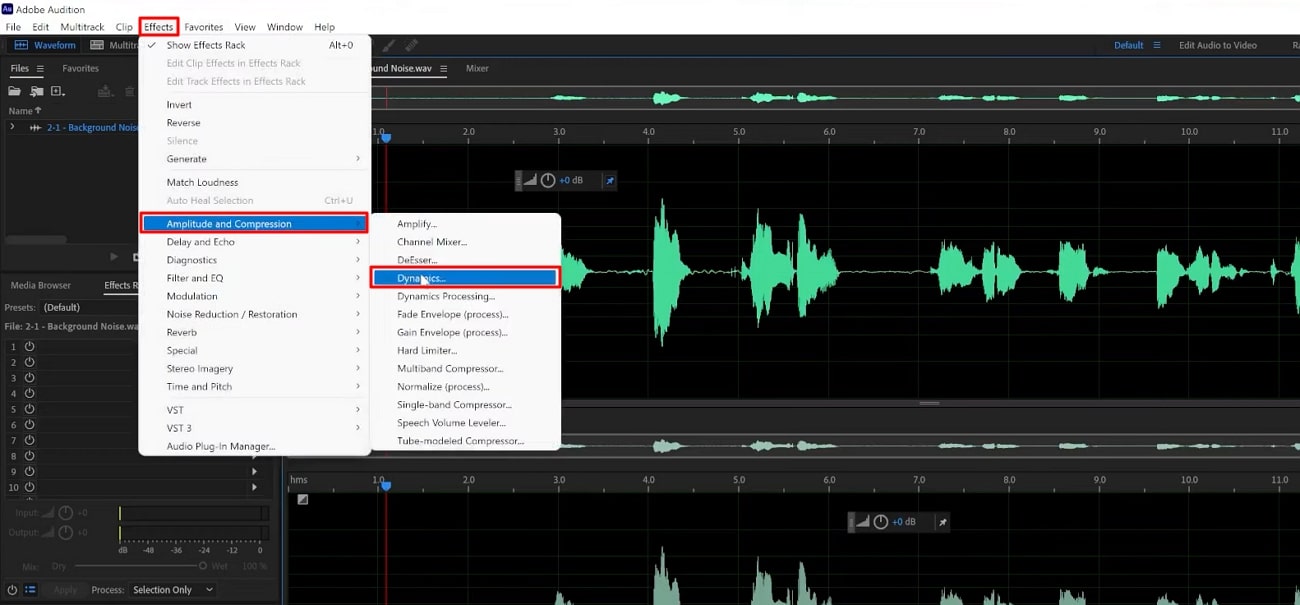
Step 2: From the Dynamics window, expand the “Preset” option and set it to “Default.” Further, activate the “AutoGate” option and change the “Threshold” value. Then, click “Apply” to save and apply these settings.
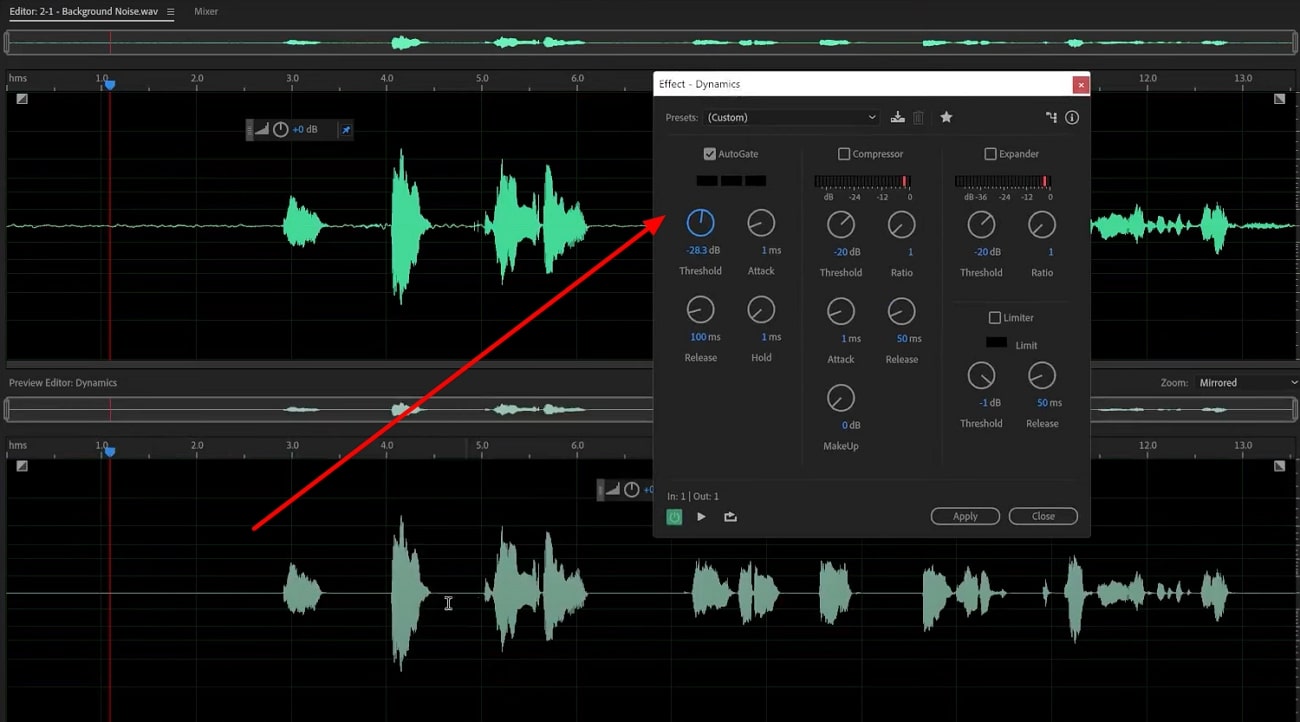
Part 3: Other Solutions That Can Be Tried to Remove Noise from Videos
Since Adobe Audition remove noise has a professional interface, it might trouble some of you. The settings can be challenging to apply, so this section is all about alternatives. In this section, you can find the online solutions for noise reduction below:
1. Flixier
With this online Adobe Audition remove noise alternative, you can remove background noise. Users simply need to upload a video and activate the enhanced audio option. The audio enhancer eliminates unnecessary sound, giving it a name and description. It is compatible with popular and worldwide media formats like WAV, MP3, etc. Moreover, you can share the video straight to social platforms.
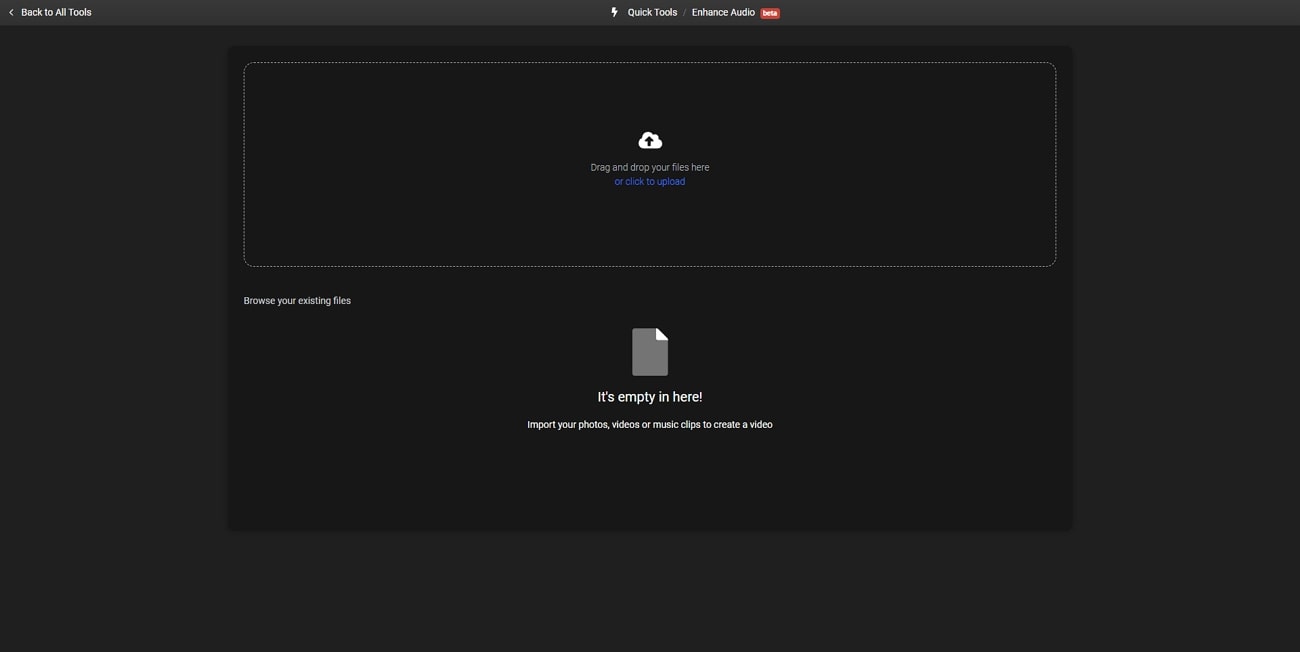
Key Features
- Offers an Improve Quality feature to clear up and enhance speech.
- Users can edit audio after denoising, and you can access its audio library to apply effects.
- Users can detach audio from the clip or fade in and out the audio effects to align with the video.
2. MyEdit
Are you looking for an online AI alternative to Adobe Audition noise reduction? This is a versatile platform for removing unwanted audio from up to 100 MB file size. It can denoise a 10 minutes file of formats like MP3, MP4, WAV, and FLAC. It enhances quality through audio denoise, wind remover, and speech enhancement. It uses AI technology to auto-remove background noise and enables a preview.
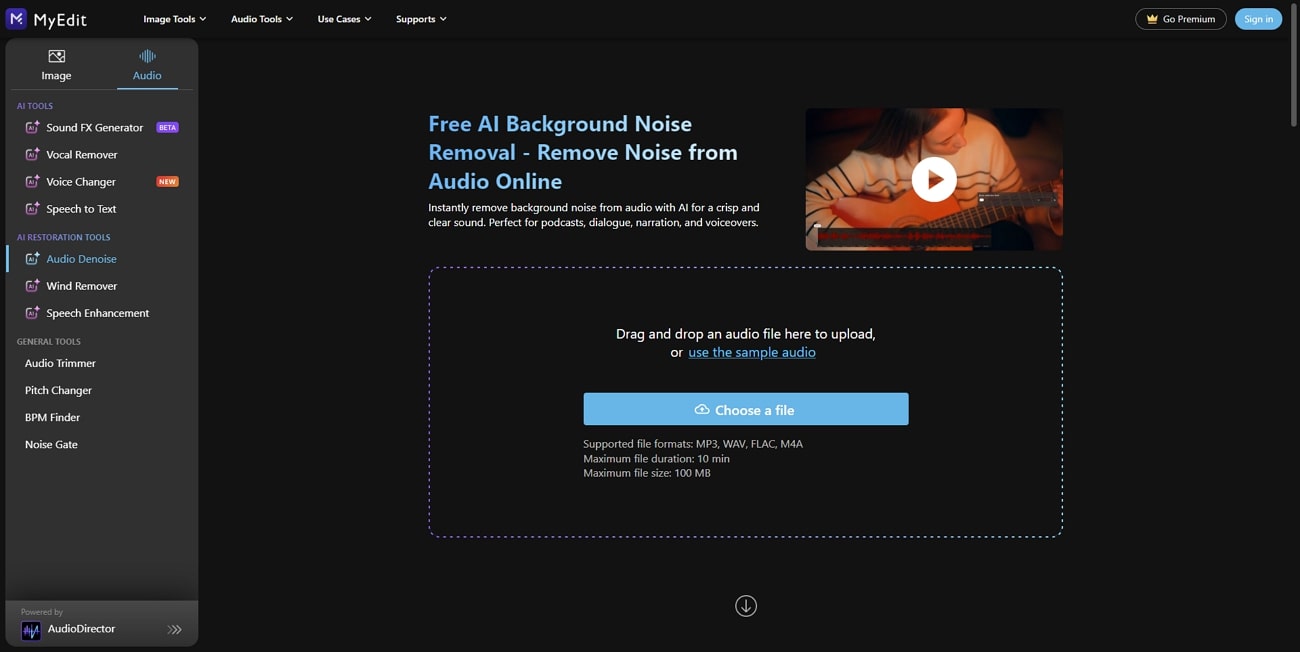
Key Features
- Users can employ its Vocal Remover to create clear and high-quality voiceovers.
- The user interface is a simple upload-to-convert process and doesn’t take up any storage.
- The AI helps accelerate the denoise process and retains audio quality.
3. KwiCut
Utilize this web-based Adobe Audition remove noise alternative to eliminate background noises. It can remove anything that declines an audio quality, like hums, hisses, and more. It removes any distractions in the background that decline communication. The AI assists in enhancing speech to maintain the professional element in the continent.
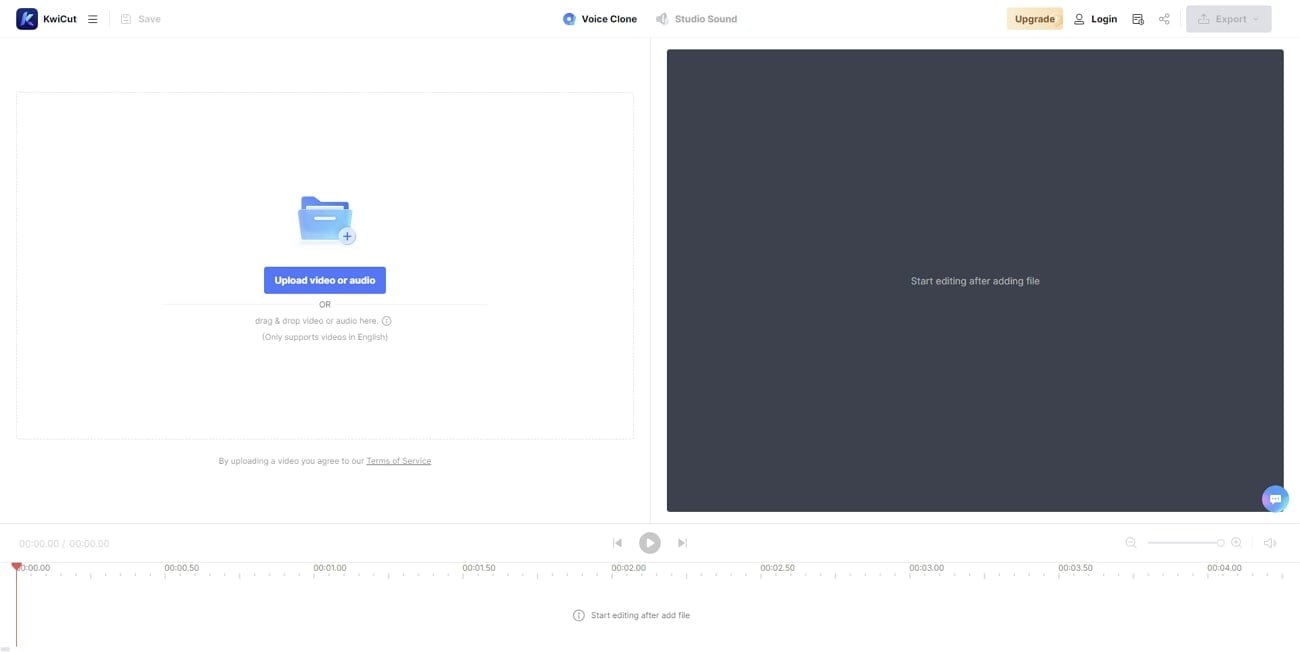
Key Features
- The tool supports a range of audio and video formats like MP3, MOV, WAV, and more.
- It supports text-based audio editing to edit audio or remove secondary noises.
- To create effective voiceovers for videos, use KwiCut’s voice cloning feature.
Part 4: Wondershare Filmora: A Unique Solution to Reducing Noise in Video and Audio Content
In contrast to all these Adobe Audition noise reduction alternatives, here is another. Wondershare Filmora is a wide platform for video, audio, and visual editing. The tool allows users to use manual and AI features to enhance content. In addition, Filmora introduced its V13 upgrade with new AI features. Amongst them is the AI Vocal Remover tool that separates vocals from background noise.
Using this tool can help you embed vocals in video tutorials or vlogs. In addition, Filmora also offers an Audio Denoise feature to remove distracting noises and voices. Users can enhance speech by removing wind noise, humming, and hissing. In addition, you can take Filmora’s Denoise AI’s assistance to do this.
Steps for Filmora AI Audio Denoise
If you wish to employ Filmora’s denoise feature, you are at the right place. This tool enables AI Speech Enhancement and Wind Removal with a denoise option. In addition, it has DeReverb, Hum Removal, and Hiss Removal. Users can manually adjust the value of this slider to set audio preferences. By following this step-by-step guide, users can remove background noises from video:
Free Download For Win 7 or later(64-bit)
Free Download For macOS 10.14 or later
Step 1: Initiate Filmora and Import Media to Timeline
First, download this AI software on your device and launch it. After logging in, locate and hit the “New Project” option and enter its editing interface. Afterward, click the “Ctrl + I” keys and choose files from your device. Once the files are imported, drag and place them in the timeline.
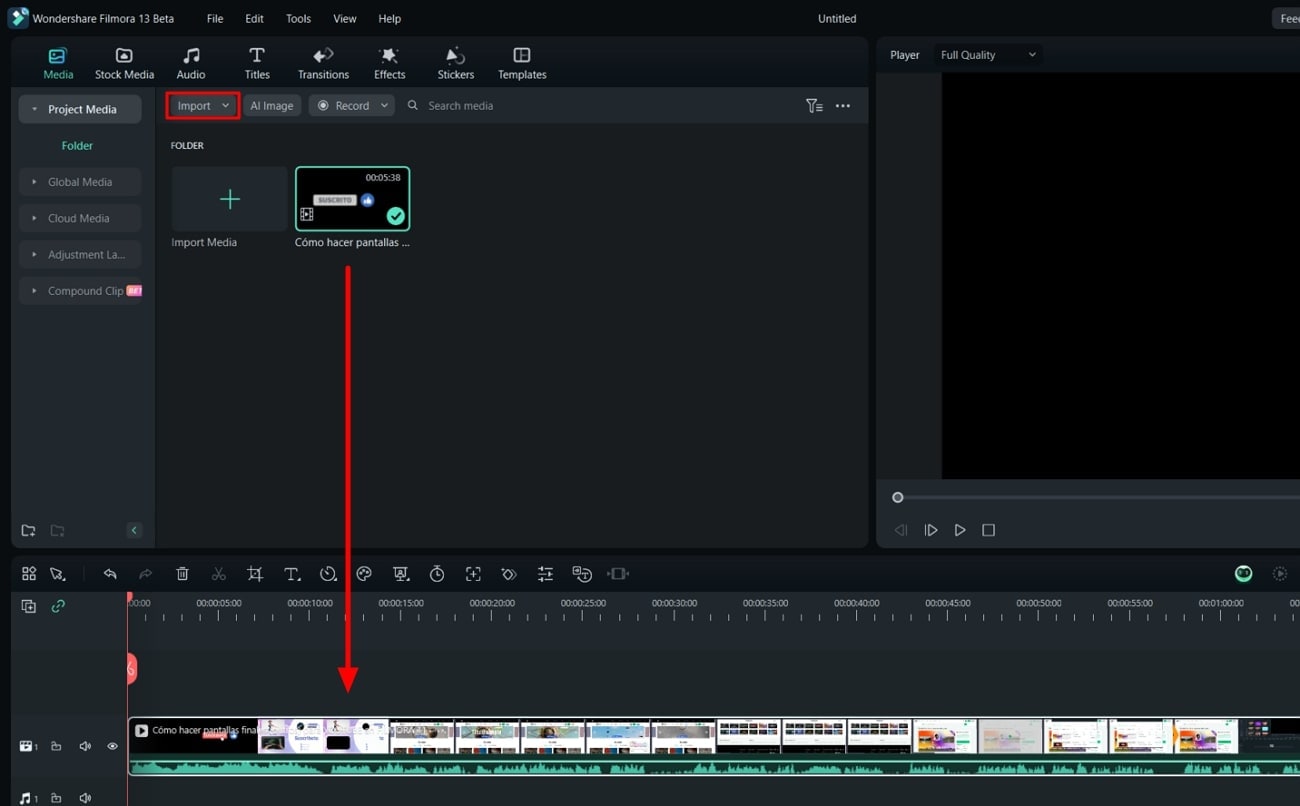
Step 2: Activate Audio Denoise
Once the media is in the timeline, select it and navigate towards the right-side panel. Under the “Audio” tab, locate and expand the “Denoise” option. In this section, enable the “Normal Denoise” button, which will auto-denoise audio. You can also use the “Denoise Level” slider to adjust the intensity of denoise.
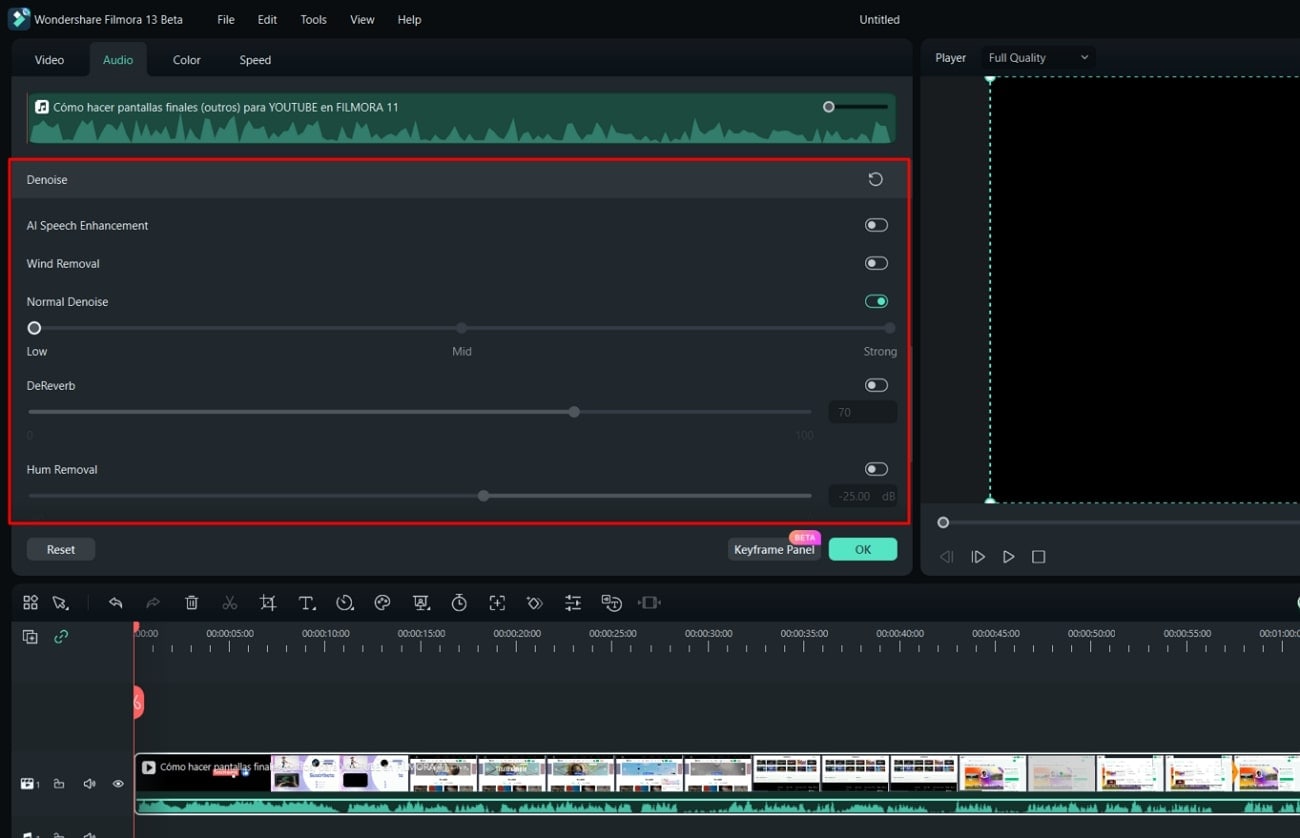
Step 3: Export the Edited File
Once you have made all the changes, click the “Export” button at the top right corner. Further, adjust export settings in the appeared window and click the “Export” button.
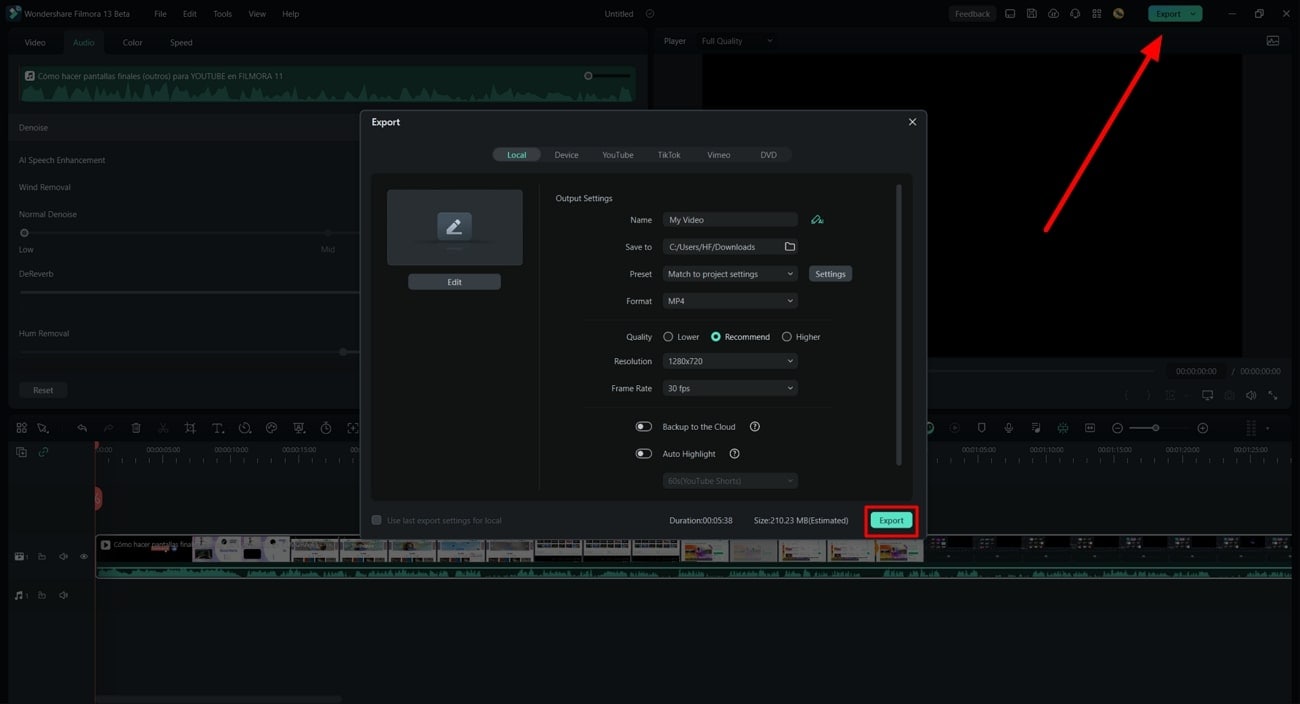
Bonus Tip: Remove Vocals from Audio with Dedicated AI Vocal Remover in Filmora
Other than denoising, you can use Vocal Remover to extract speech from the background. It separates both vocals and background noise. We have crafted the step-by-step procedure to use vocal remover:
Step 1: Start Filmora and Import Video
Begin by installing and launching Wondershare Filmora on your device. Log in and select the “New Project” tab to access Filmora’s editing interface. Next, use the “Import” option to import files from your device. Once imported, simply drag and drop them onto the timeline.
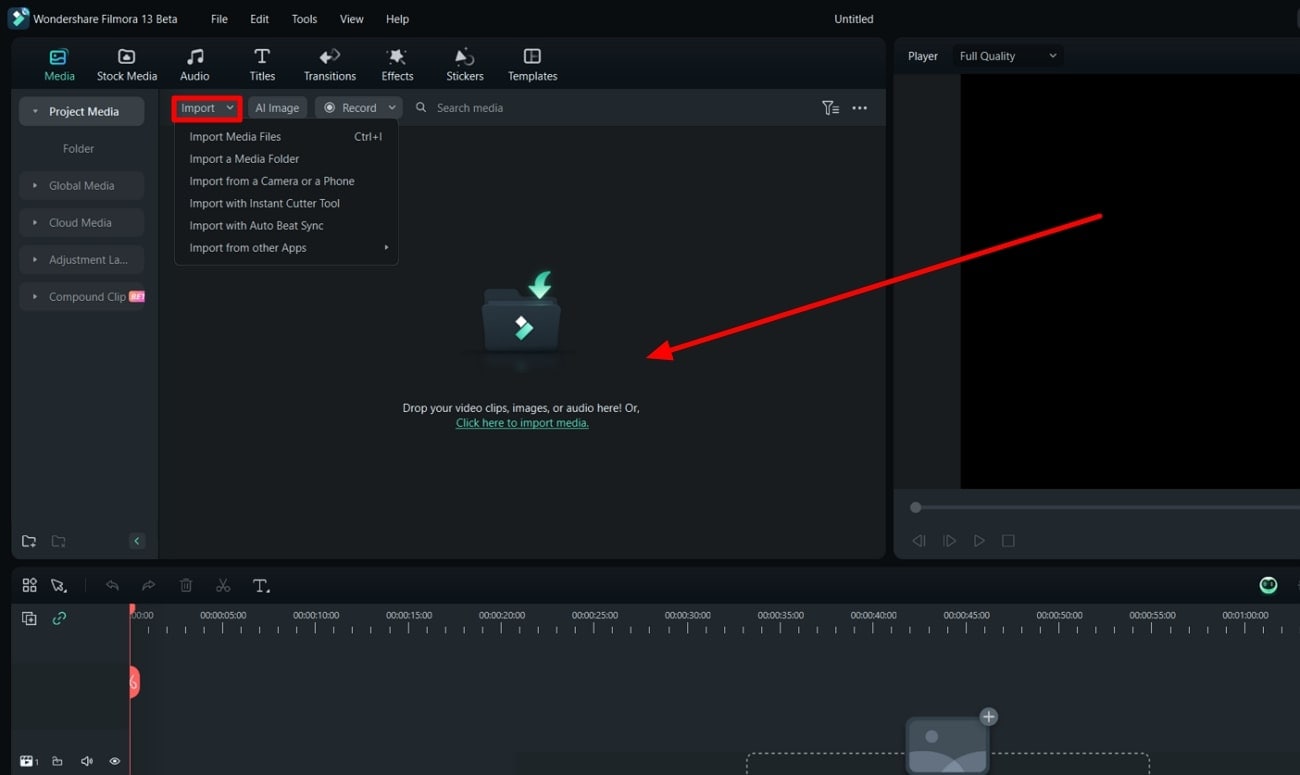
Step 2: Access the AI Vocal Remover
Next, direct towards the timeline panel and right-click on the video in the timeline. From the options menu, select the “AI Vocal Remover” option. The AI will start separating vocals from background audio.
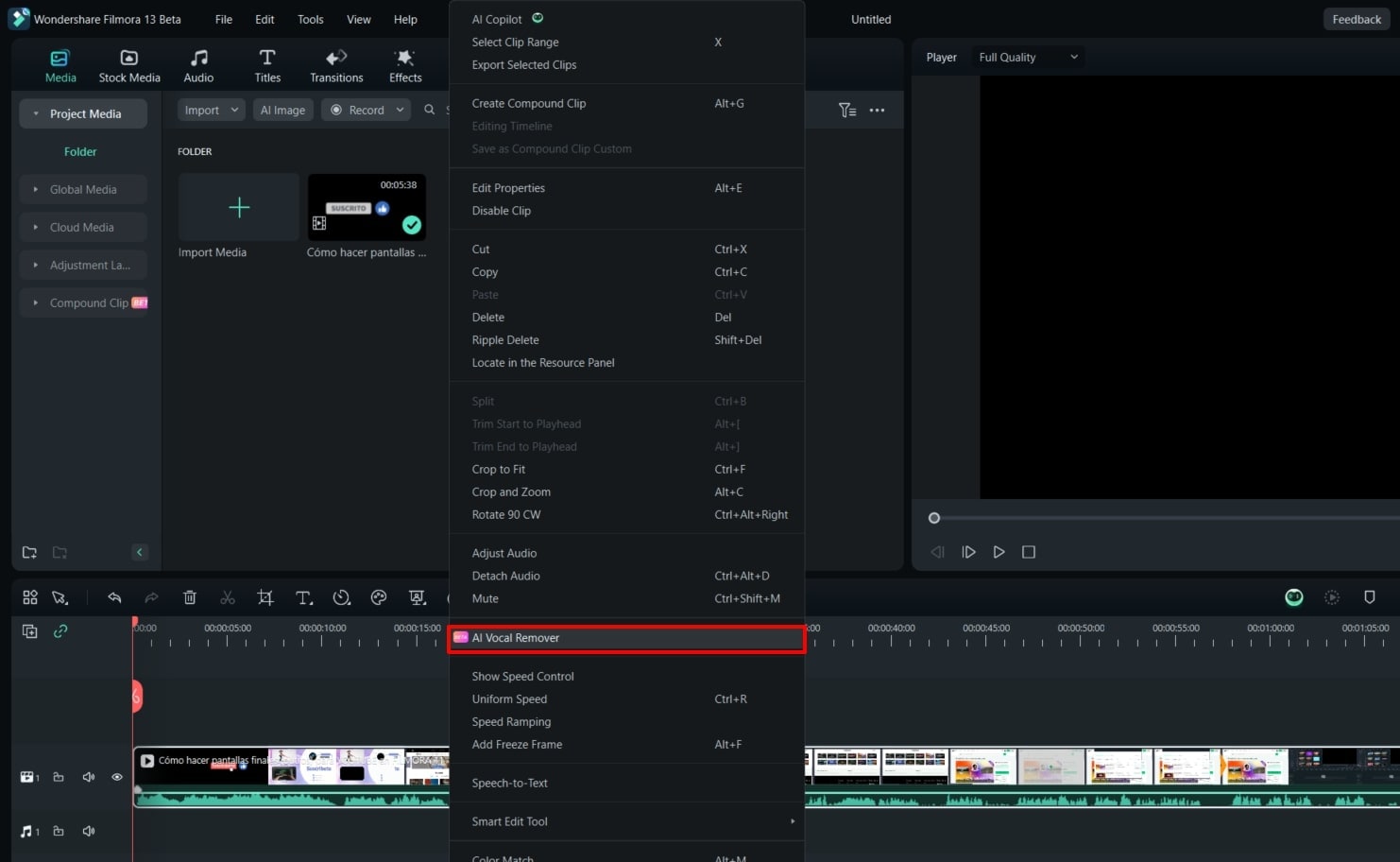
Step 3: Download the AI Processed Video
Once both vocals and background noise are separate, delete the background audio. Then, click the “Export” button to download this file on your device.
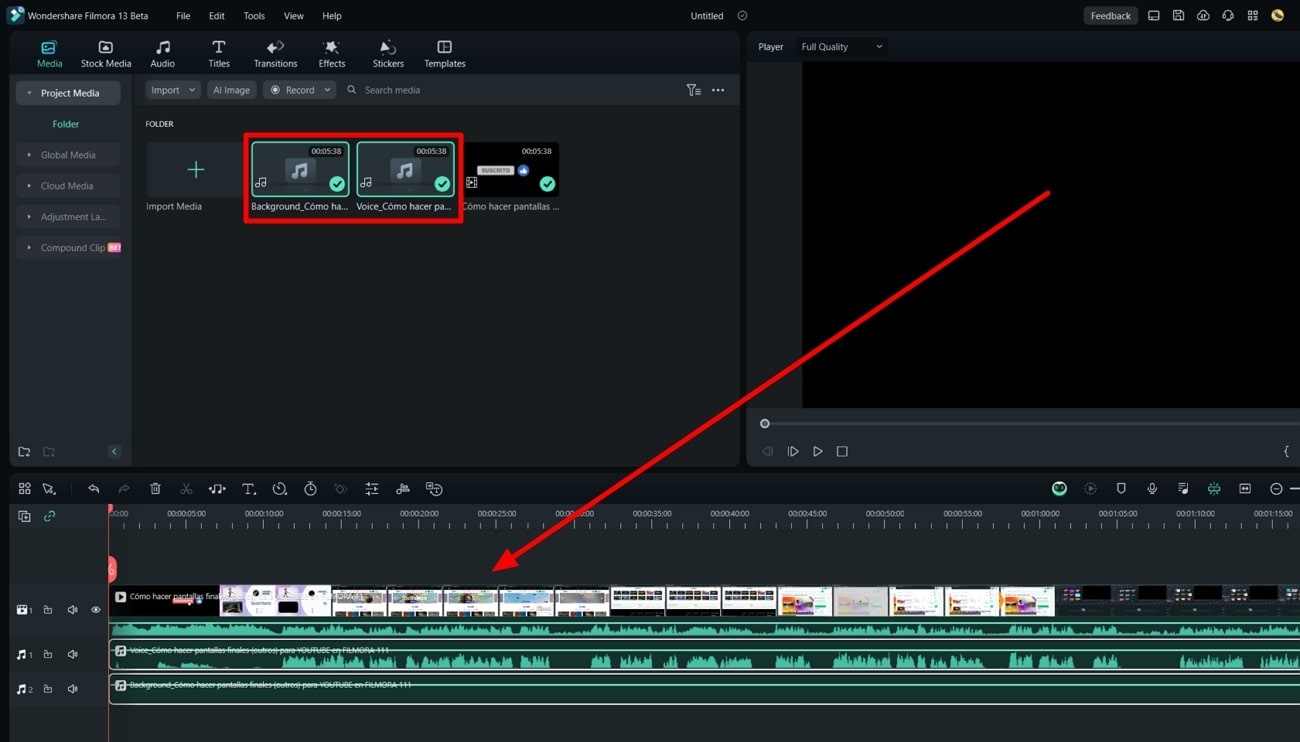
Free Download For Win 7 or later(64-bit)
Free Download For macOS 10.14 or later
Conclusion
After reading this article, users have knowledge of noise reduction in Audition. The article discussed different methods of removing noises in this professional software. Users can employ the web-based Adobe Audition noise reduction alternatives.
If you want a next-level tool for creative editing, then download Wondershare Filmora. The article discussed two methods for enhancing audio content. The software is compatible across multiple platforms to assist all types of users.
Free Download Free Download Learn More

Part 1: What Do You Know About Background Noise?
Background noise is anything that disturbs the pace of the video and diverts the viewer’s attention. It is the unwanted and unintended sound that takes up your audio. This may include someone chatting in the background, wind noise, and other noises. These factors decline and disrupt the clarity of audio. However, these elements can be managed through various tools and techniques to help creators.
Part 2: How to Remove Noise from Adobe Audition: A Comprehensive Review
Adobe Audition is a tool tailored to assist in audio editing tasks with precision. Users can create, merge, and mix different sound effects and be creative with them. It also has seamless support of Adobe After Effects and Adobe Stock for this purpose. Noise reduction Audition is one of its features that helps in cleaning and enhancing audio. It clears out any unnecessary background noises from any project.
In addition, the tool allows you to manage the audio levels for denoising. Along with manual settings, you can also add denoise effects to reduce background effects. You can manage high and low frequencies in Adobe Audition to remove noise. Upon editing this software, you can review the results afterward.
Different Methods of Audio Reduction in Adobe Audition
As a content creator, you must often manage dialogues and music within a video. Combining both can sometimes get the focus off actual dialogues. This can be due to many reasons; however, the solution is noise reduction in Audition. In this section, you can explore different methods to reduce noise:
1. Noise Reduction Effect
In this section, we are doing a noise reduction Audition manually. The process is straightforward, and here is a step-by-step guide to it:
Step 1: Upon importing your audio in Adobe Audition, navigate towards the top toolbar. Select the “Effects” tab and choose “Noise Reduction/Restoration” from the dropdown menu. As the menu expands further, select “Noise Reduction.”

Step 2: This will feature a Noise Reduction window on your screen. In this window, select the “Capture Noise Print” tab and adjust the Noise Reduction slider. Afterwards, press the play button on this window to listen to the audio and select “Apply.”

2. DeNoise Effect
This is the second method of Adobe Audition to remove noise. Accessing this option is almost the same, but settings may vary. Here is an instruction manual on how you can denoise in Audition:
Step 1: Once you have imported media into the timeline, reach the upper toolbar. Look for the “Effects” tab and proceed to the “Noise Reduction/Restoration” settings. From the expansion panel, choose the “DeNoise” option.

Step 2: After accessing the DeNoise window appearing on the screen, direct towards it. Then, change the position of the “Amount” slider and play your audio. Further, select the “Apply” button to add this effect to your audio.

3. Dynamic Effect
Another audio effect that you can apply and adjust in the same manner is the dynamic effect. Follow the steps given below to achieve this effect:
Step 1: After selecting the “Audio” tab, choose “Amplitude and Compression” from the dropdown menu. Expand this option and select “Dynamics” from the expansion menu.

Step 2: From the Dynamics window, expand the “Preset” option and set it to “Default.” Further, activate the “AutoGate” option and change the “Threshold” value. Then, click “Apply” to save and apply these settings.

Part 3: Other Solutions That Can Be Tried to Remove Noise from Videos
Since Adobe Audition remove noise has a professional interface, it might trouble some of you. The settings can be challenging to apply, so this section is all about alternatives. In this section, you can find the online solutions for noise reduction below:
1. Flixier
With this online Adobe Audition remove noise alternative, you can remove background noise. Users simply need to upload a video and activate the enhanced audio option. The audio enhancer eliminates unnecessary sound, giving it a name and description. It is compatible with popular and worldwide media formats like WAV, MP3, etc. Moreover, you can share the video straight to social platforms.

Key Features
- Offers an Improve Quality feature to clear up and enhance speech.
- Users can edit audio after denoising, and you can access its audio library to apply effects.
- Users can detach audio from the clip or fade in and out the audio effects to align with the video.
2. MyEdit
Are you looking for an online AI alternative to Adobe Audition noise reduction? This is a versatile platform for removing unwanted audio from up to 100 MB file size. It can denoise a 10 minutes file of formats like MP3, MP4, WAV, and FLAC. It enhances quality through audio denoise, wind remover, and speech enhancement. It uses AI technology to auto-remove background noise and enables a preview.

Key Features
- Users can employ its Vocal Remover to create clear and high-quality voiceovers.
- The user interface is a simple upload-to-convert process and doesn’t take up any storage.
- The AI helps accelerate the denoise process and retains audio quality.
3. KwiCut
Utilize this web-based Adobe Audition remove noise alternative to eliminate background noises. It can remove anything that declines an audio quality, like hums, hisses, and more. It removes any distractions in the background that decline communication. The AI assists in enhancing speech to maintain the professional element in the continent.

Key Features
- The tool supports a range of audio and video formats like MP3, MOV, WAV, and more.
- It supports text-based audio editing to edit audio or remove secondary noises.
- To create effective voiceovers for videos, use KwiCut’s voice cloning feature.
Part 4: Wondershare Filmora: A Unique Solution to Reducing Noise in Video and Audio Content
In contrast to all these Adobe Audition noise reduction alternatives, here is another. Wondershare Filmora is a wide platform for video, audio, and visual editing. The tool allows users to use manual and AI features to enhance content. In addition, Filmora introduced its V13 upgrade with new AI features. Amongst them is the AI Vocal Remover tool that separates vocals from background noise.
Using this tool can help you embed vocals in video tutorials or vlogs. In addition, Filmora also offers an Audio Denoise feature to remove distracting noises and voices. Users can enhance speech by removing wind noise, humming, and hissing. In addition, you can take Filmora’s Denoise AI’s assistance to do this.
Steps for Filmora AI Audio Denoise
If you wish to employ Filmora’s denoise feature, you are at the right place. This tool enables AI Speech Enhancement and Wind Removal with a denoise option. In addition, it has DeReverb, Hum Removal, and Hiss Removal. Users can manually adjust the value of this slider to set audio preferences. By following this step-by-step guide, users can remove background noises from video:
Free Download For Win 7 or later(64-bit)
Free Download For macOS 10.14 or later
Step 1: Initiate Filmora and Import Media to Timeline
First, download this AI software on your device and launch it. After logging in, locate and hit the “New Project” option and enter its editing interface. Afterward, click the “Ctrl + I” keys and choose files from your device. Once the files are imported, drag and place them in the timeline.

Step 2: Activate Audio Denoise
Once the media is in the timeline, select it and navigate towards the right-side panel. Under the “Audio” tab, locate and expand the “Denoise” option. In this section, enable the “Normal Denoise” button, which will auto-denoise audio. You can also use the “Denoise Level” slider to adjust the intensity of denoise.

Step 3: Export the Edited File
Once you have made all the changes, click the “Export” button at the top right corner. Further, adjust export settings in the appeared window and click the “Export” button.

Bonus Tip: Remove Vocals from Audio with Dedicated AI Vocal Remover in Filmora
Other than denoising, you can use Vocal Remover to extract speech from the background. It separates both vocals and background noise. We have crafted the step-by-step procedure to use vocal remover:
Step 1: Start Filmora and Import Video
Begin by installing and launching Wondershare Filmora on your device. Log in and select the “New Project” tab to access Filmora’s editing interface. Next, use the “Import” option to import files from your device. Once imported, simply drag and drop them onto the timeline.

Step 2: Access the AI Vocal Remover
Next, direct towards the timeline panel and right-click on the video in the timeline. From the options menu, select the “AI Vocal Remover” option. The AI will start separating vocals from background audio.

Step 3: Download the AI Processed Video
Once both vocals and background noise are separate, delete the background audio. Then, click the “Export” button to download this file on your device.

Free Download For Win 7 or later(64-bit)
Free Download For macOS 10.14 or later
Conclusion
After reading this article, users have knowledge of noise reduction in Audition. The article discussed different methods of removing noises in this professional software. Users can employ the web-based Adobe Audition noise reduction alternatives.
If you want a next-level tool for creative editing, then download Wondershare Filmora. The article discussed two methods for enhancing audio content. The software is compatible across multiple platforms to assist all types of users.
The Ultimate Guide to Best Podcast Platforms
10 Best Podcast Hosting Platforms

Benjamin Arango
Mar 27, 2024• Proven solutions
Covering interesting topics in your podcasts or using professional audio recording and editing tools to process them, won’t mean much if you cannot reach your audience. Uploading a large numbers of audio files to your own website is not always an option, since the storage space, you have at your disposal may be too small to store all of your podcasts.
That is where podcast hosting platforms like Buzzsprout or Podbean come in, to help podcasters store their content safely and deliver their latest podcast to different apps and directories through the RSS feed.
With so many options out there, finding a podcast hosting platform can be a daunting task for podcasters who are just starting out. So, in this article, we are going to take you through the ten best podcast hosting platforms and provide you with answers to some of the most commonly asked questions about podcast hosting services.
- Part 1: Top Ten Podcast Hosting Platforms
- Part 2: Most Frequently Asked Questions about Podcast Hosting Platforms
Comparison of the Best Podcast Hosting Platforms
Are you too busy to go through all of the podcast hosting platforms we featured in this article? Do not worry, here’s a quick comparison of the best podcast hosting platforms.
| Hosting Platform | Subscription Cost | Storage | Bandwidth | Podcast Analytics | RSS Support | Website host |
|---|---|---|---|---|---|---|
| Buzzsprout | Ranges from free to $24 | Unlimited | 250 GB | Yes | Yes | Yes |
| Blubrry | Ranges from $12 to $80 per month | 100 MB | Unlimited | Yes | Yes | Yes |
| Castos | Ranges from $19 to $49 per month | Unlimited | Unlimited | Yes | Yes | Yes |
| Podbean | Ranges from free to $99 per month | Unlimited | Unlimited | Yes | Yes | Yes |
| Podiant | Ranges from $12,99 to 35,97 per month | Unlimited | Unlimited | Yes | Yes | Yes |
| Transistor.fm | Ranges from $19,00 to $99 per month | Unlimited | Unlimited | Yes | Yes | Yes |
| Simplecast | Ranges from $15 to $85 per month | Unlimited | 20,000 downloads | Yes | Yes | Yes |
| Speaker | Ranges from free to $50 per month | Varies from 5 to 1500 hours | Unlimited | Yes | Yes | No |
| Libsyn | Ranges from $5 to $150 per month | Varies between 50 MB and 80 MB | Unlimited | Yes | Yes | Yes |
| PODOMATIC | Ranges from free to $20, 82 per month | Limited, depends on the subscription model | Limited, depends on the subscription model | Yes | Yes | Yes |
Part 1: Top Ten Podcast Hosting Platforms
Building an audience for your podcast can take months, sometimes even years, and for that reason having access to a reliable hosting platform that lets you distribute new episodes of your podcast effortlessly is vital for their success. Factors that range from subscription fees to RSS support can influence your choice of a podcast hosting platform, so let’s take a look at what some of the best hosting platforms for podcasters have to offer.
1. Buzzsprout
Price: Free, pricing options start at $12 per month
The fact that over 100,000 podcasters used Buzzsprout’s services to launch their podcasts, shows how highly esteemed the platform is within the podcasting community. The episode automation feature enables you to just upload an audio file and it takes care of the ID3 tags and bitrates for you. Buzzsprout grants you access to a huge audience by allowing your subscribers to listen to your podcast from Spotify, Apple and Google Podcasts, Alexa or Overcast. The platform also provides you with advanced statistics for each episode of your podcast you upload. So, you can easily find out which apps they are using to listen to your podcasts or to learn the location at which your podcast was played.
Pros
- Unlimited storage space
- 90-day trial period
- Grants users access to most popular podcast directories
- Offers monetization options through affiliate marketing
Cons
- Bandwidth is limited to 250 GB
- The free version of Buzzsprout places ads to your podcasts on public sites
2. Blubrry
Price: Pricing options start at $12 per month
Uploading a new podcast and publishing it through Blubrry is a simple three-step process that can be completed in just a few minutes. This hosting platform grants you complete control over the iTunes’ RSS feed and it is optimized for the use on Android devices. In case you are considering moving from another platform like Libsyn or SoundCloud, you can easily migrate all of your content to Blubrry. Even though this podcast hosting platform features analytics tools you must purchase the Podcast Statistics package if you want to have a clear overview of the statistics your podcasts are generating.
Pros
- The effortless podcast publishing process
- Offers WordPress plugins
- Free and easy media migration
- Unlimited bandwidth
Cons
- Storage space depends on the subscription plan
- Access to analytics tools is not free
3. Castos
Price: Pricing options start at $19 per month
If you are searching for a platform that places no limits on your storage space or the bandwidth then you shouldn’t look much further than Castos. The platform lets you create as many new shows as you want and allows you to upload an unlimited number of episodes to each show you create. Podcasts you upload to Castos are automatically shared to all of the most popular podcast directories, including Sticher, iTunes, Spotify or Google Play. You can also transcribe all of your podcasts with a click of a button, but you must pay a small fee for each minute of the podcast you transcribe.
Pros
- Fully customizable podcast player
- Offers support for both audio and video podcasts
- Advanced analytics tools
- Grants podcasters access to all of the most popular podcast directories
Cons
- Short free trial period
- Video republishing to YouTube is only available within the Growth subscription model
4. Podbean
Price: Free, pricing options start at $9 per month
Podcasters who would like to have their own full-featured podcast website and gain access to a website builder can hardly go wrong if they opt for Podbean. Moreover, you’ll be able to use your own domain and your branding if you create an account on this hosting platform. Podbean offers a broad selection of podcast templates and lets you choose the layout. Furthermore, Podbean provides excellent monetization opportunities, either through advertising, crowdfunding or premium content. The free version of the podcast hosting platform offers only limited broadband and storage space, while video support is only available if you purchase Unlimited Plus or Business pricing plans.
Pros
- Compatible with iPhone and Android apps and embeddable media players
- Provides RSS and iTunes support
- Offers a broad selection of podcast themes
- Allows podcasters to create their own podcast sites
Cons
- You must upgrade from the free version in order to have unlimited storage and bandwidth
- Running multiple podcast channels is only possible if you have the Business pricing plan
5. Podiant
Price: Pricing plans start at $12,99
Podiant grants you access to all the tools you are going to need to upload and publish a new episode of your podcast. In fact, 22,200 podcast episodes are published through Poidant each day that are delivered to hundreds of thousands of listeners around the globe. The platform lets you choose from a broad range of themes, but it also features a templating engine that allows you to change the code on your podcasting site. Moreover, you can use Poidant to create a blog, embed content from Twitter, Instagram or YouTube in order to extend the reach of your podcasts and broaden their audience.
Pros
- Allows users to host all their shows on one website
- No bandwidth and storage space limitations
- Compatible with all major podcasting directories and apps
- Supports integrations through Zapier
Cons
- The quality of the analytics data depends on the subscription plan
- The free trial period lasts only two weeks
6. Transistor
Price: Pricing plans start at $19,00 per month
Professional podcasters and creatives from every corner of the world are already using Transistor to publish their podcasts. This podcast hosting platform makes all episodes of your podcasts available on Spotify, Overcast, and other popular podcast directories. Moreover, you can create unlimited podcasts and upload as many episodes as you want to the website you created with Transistor. The platform produces analytics reports for each of your podcasts, regardless of the pricing plan you own, but the number of collaborators on a single Transistor account depends on the subscription model. The number of monthly podcast downloads is limited and it varies from one pricing plan to another.
Pros
- Allows users to create private podcast feeds
- Supports integrations with email marketing platforms like Drip or MailChimp
- Embeddable podcast player
- The functionally organized RSS feed
Cons
- You must purchase the Business subscription model to remove the Transistor’s branding
- If you would like to create more than three private podcasts, you must contact the customer support
7. Simplecast
Price: Pricing options start at $15
The distribution, analytics, and sharing tools this podcast hosting platform provides are powerful enough to cater even for the most demanding podcasting needs. Simplecast lets you choose from a variety of themes that are optimized for mobile devices and search engines. It also enables you to customize the colors of each theme with its website builder. All podcasts you upload to Simplecast can be shared on all of the podcast directories that attract millions of listeners. What’s more, the platform makes monitoring the statistics your podcasts generate easy, so that you can discover new ways to reach new audiences.
Pros
- Websites built with Simplecast are secure
- Great selection of web-players
- Provides detailed statistics for all podcasts
- Doesn’t restrict the bandwidth or storage space
Cons
- The size of the team using Simplecast can’t exceed eight members
- Building more than three pages with Simplecast isn’t an option
8. Spreaker
Price: Free, pricing options start at $7 per month
Spreaker is an affordable podcast hosting platform for all podcasters who are just starting out or looking for a new platform they can use to host their shows. In addition, you can also stream your podcasts live, although their maximum duration depends on the subscription plan you have. The storage space you are going to have at your disposal also varies from one pricing plan to another, but even the free version of Spreaker lets you store up to five hours of audio on the cloud. However, there are no limits to the number of listeners which enables you to grow your audience continually.
Pros
- An inexpensive option for both novice and seasoned podcasters
- A fully customizable RSS feed
- Supports content migrations through RSS feed
- Provides excellent monetization options
Cons
- The storage space is limited
- You must purchase the Broadcaster subscription model in order to gain access to the platform’s analytics tools.
9. Libsyn
Price: Pricing options start at $5
This platform integrates with more than twenty podcast apps, social media platforms, and WordPress websites via the OnPublish feature. Libsyin features powerful scheduling tools, which enables you to choose the exact date and time when the next episode of your podcast is going to be published. The RSS is compliant with Apple Podcasts, which makes it easier to add a title, choose a category or write podcast summaries for each new episode you would like to optimize for playback on Apple devices. Libsyn offers Double Opt-in Advertising and MyLibSyn Premium Paywall monetization options so that you can choose the method of earning money through this podcast hosting platform that is the most convenient for you.
Pros
- Supports audio, video, text and PDF hosting
- Excellent podcast distribution capabilities
- Cheaper than most of its competitors
- Creating a publishing schedule for your podcasts is easy
Cons
- Very limited storage space, regardless of the pricing plan you purchase
- Underwhelming statistics tracking options
10. Podomatic
Price: Free, pricing options start at $8,32
The options you will have at your disposal if you opt to publish your podcasts with Podomatic, largely depends on the subscription model you have. Even though anyone can use this podcast platform for free, the bandwidth and storage space that are available on the free version of Podomatic can limit your options. Besides, publishing podcasts, you can also use the platform to listen to podcasts, from browsers or iPhone and Android devices. Podomatic lets you monetize your podcasts by connecting your Patreon account to your podcast website or by adding Podomatic Podcast to Advertise Cast.
Pros:
- Podomatic app is available for both iOS and Android devices
- Podcast published through Podomatic can be played directly from Twitter and Facebook feeds
- Equipped with a powerful drag-and-drop website builder
- Offers a variety of themes designed exclusively for podcasts
Cons
- Unlimited storage space and bandwidth are only available in the Enterprise subscription model
- Offers only basic podcast statistics
Part 2: The Most Frequently Asked Questions about Podcast Hosting Platforms
In order to add episodes of your podcasts to podcast directories, you must meet only three requirements. Your audio file must be saved in the MP3 format, you must have access to the podcast hosting platform, and you must be able to add a podcast to an RSS feed. The hosting platform you selected will utilize its RSS feed to distribute your podcasts to the apps and services your audience is using to listen to them and deliver a new episode of your show to your listeners as soon as you publish it. The reach of your podcasts, your monetization capabilities or whether or not you will be able to create custom domains depends on the podcast hosting platform you choose.
What is podcast hosting and what are its main benefits?
All podcast hosting platforms let their users store their podcasts online and create an RSS feed for them that is used to add podcast to different podcast directories. Besides sending each new episode of your podcast to your subscribers, podcast hosting platforms also enable you to track their performance and learn which apps were used to access them as well as a plethora of other relevant metrics. Some podcast hosting platforms feature website builders that allow you to create custom domain landing pages, blogs or add widgets.
Why do I need podcast hosting services?
Podcast hosting services simplify the process of storing and publishing podcasts and ensure that each new episode you publish reaches your subscribers. In addition, most platforms offer a quick and easy way to add tags, cover art or podcast descriptions, so that you can provide all the information your listeners need to find your podcasts effortlessly.
How to select the right podcast hosting platform?
The reason why you are creating a podcast can often help you figure out which podcast hosting platform is the best option for you. If you would like to periodically share short interviews or simply have fun with your friends, then choosing a free version of a podcast hosting platform is your best option.
However, if you take podcasting seriously, finding out how much storage space a platform offers or the maximum bandwidth can help you decide if the platform you are considering is the right choice for you. Moreover, podcasters who also create video podcasts should check if the platform they would like to use to distribute their podcasts supports hosting and publishing video files. Ultimately, the amount of money you are willing to spend on subscription will determine which podcast hosting platform to pick since there is no reason to spend vast amounts of money on features you have no intention of using.
Is podcast hosting free?
Even though most podcast hosting platforms either have free versions or free trial, podcast hosting over an extended period of time is never free. Each platform offers different pricing options and lets you choose the one that is best suited for your needs. If you decide to publish your podcasts with a free version of the podcast hosting platform, you should keep in mind that the scope of your options is going to be limited.
What is the average cost of podcast hosting services?
The cost of a monthly subscription for a podcast hosting service can be anywhere between $7 and $99. The majority of basic and pro pricing plans can be purchased for less than $20, but if you would like to utilize all the features a podcast hosting platform has to offer, then your monthly subscription can cost much more than a hundred dollars. Lower priced options often lack advanced file-sharing tools or don’t provide integrations features, which is the reason why you should only consider them if you just need a quick way to publish a podcast.
Conclusion
Each step of the process of creating a podcast is equally important, and the quality of the microphone you’re using to record an episode of your podcast is of no less significance than the hosting platform you’re using to publish a podcast. Each podcast hosting platform we included in this article ensures that your podcasts are delivered to all of your subscribers, but which one you are going to choose depends on a plethora of factors that range from a platform’s storage capacity to the number of podcast directories to which your podcasts are added. Which podcast hosting platform are you using to publish your podcasts? Leave a comment and let us know.

Benjamin Arango
Benjamin Arango is a writer and a lover of all things video.
Follow @Benjamin Arango
Benjamin Arango
Mar 27, 2024• Proven solutions
Covering interesting topics in your podcasts or using professional audio recording and editing tools to process them, won’t mean much if you cannot reach your audience. Uploading a large numbers of audio files to your own website is not always an option, since the storage space, you have at your disposal may be too small to store all of your podcasts.
That is where podcast hosting platforms like Buzzsprout or Podbean come in, to help podcasters store their content safely and deliver their latest podcast to different apps and directories through the RSS feed.
With so many options out there, finding a podcast hosting platform can be a daunting task for podcasters who are just starting out. So, in this article, we are going to take you through the ten best podcast hosting platforms and provide you with answers to some of the most commonly asked questions about podcast hosting services.
- Part 1: Top Ten Podcast Hosting Platforms
- Part 2: Most Frequently Asked Questions about Podcast Hosting Platforms
Comparison of the Best Podcast Hosting Platforms
Are you too busy to go through all of the podcast hosting platforms we featured in this article? Do not worry, here’s a quick comparison of the best podcast hosting platforms.
| Hosting Platform | Subscription Cost | Storage | Bandwidth | Podcast Analytics | RSS Support | Website host |
|---|---|---|---|---|---|---|
| Buzzsprout | Ranges from free to $24 | Unlimited | 250 GB | Yes | Yes | Yes |
| Blubrry | Ranges from $12 to $80 per month | 100 MB | Unlimited | Yes | Yes | Yes |
| Castos | Ranges from $19 to $49 per month | Unlimited | Unlimited | Yes | Yes | Yes |
| Podbean | Ranges from free to $99 per month | Unlimited | Unlimited | Yes | Yes | Yes |
| Podiant | Ranges from $12,99 to 35,97 per month | Unlimited | Unlimited | Yes | Yes | Yes |
| Transistor.fm | Ranges from $19,00 to $99 per month | Unlimited | Unlimited | Yes | Yes | Yes |
| Simplecast | Ranges from $15 to $85 per month | Unlimited | 20,000 downloads | Yes | Yes | Yes |
| Speaker | Ranges from free to $50 per month | Varies from 5 to 1500 hours | Unlimited | Yes | Yes | No |
| Libsyn | Ranges from $5 to $150 per month | Varies between 50 MB and 80 MB | Unlimited | Yes | Yes | Yes |
| PODOMATIC | Ranges from free to $20, 82 per month | Limited, depends on the subscription model | Limited, depends on the subscription model | Yes | Yes | Yes |
Part 1: Top Ten Podcast Hosting Platforms
Building an audience for your podcast can take months, sometimes even years, and for that reason having access to a reliable hosting platform that lets you distribute new episodes of your podcast effortlessly is vital for their success. Factors that range from subscription fees to RSS support can influence your choice of a podcast hosting platform, so let’s take a look at what some of the best hosting platforms for podcasters have to offer.
1. Buzzsprout
Price: Free, pricing options start at $12 per month
The fact that over 100,000 podcasters used Buzzsprout’s services to launch their podcasts, shows how highly esteemed the platform is within the podcasting community. The episode automation feature enables you to just upload an audio file and it takes care of the ID3 tags and bitrates for you. Buzzsprout grants you access to a huge audience by allowing your subscribers to listen to your podcast from Spotify, Apple and Google Podcasts, Alexa or Overcast. The platform also provides you with advanced statistics for each episode of your podcast you upload. So, you can easily find out which apps they are using to listen to your podcasts or to learn the location at which your podcast was played.
Pros
- Unlimited storage space
- 90-day trial period
- Grants users access to most popular podcast directories
- Offers monetization options through affiliate marketing
Cons
- Bandwidth is limited to 250 GB
- The free version of Buzzsprout places ads to your podcasts on public sites
2. Blubrry
Price: Pricing options start at $12 per month
Uploading a new podcast and publishing it through Blubrry is a simple three-step process that can be completed in just a few minutes. This hosting platform grants you complete control over the iTunes’ RSS feed and it is optimized for the use on Android devices. In case you are considering moving from another platform like Libsyn or SoundCloud, you can easily migrate all of your content to Blubrry. Even though this podcast hosting platform features analytics tools you must purchase the Podcast Statistics package if you want to have a clear overview of the statistics your podcasts are generating.
Pros
- The effortless podcast publishing process
- Offers WordPress plugins
- Free and easy media migration
- Unlimited bandwidth
Cons
- Storage space depends on the subscription plan
- Access to analytics tools is not free
3. Castos
Price: Pricing options start at $19 per month
If you are searching for a platform that places no limits on your storage space or the bandwidth then you shouldn’t look much further than Castos. The platform lets you create as many new shows as you want and allows you to upload an unlimited number of episodes to each show you create. Podcasts you upload to Castos are automatically shared to all of the most popular podcast directories, including Sticher, iTunes, Spotify or Google Play. You can also transcribe all of your podcasts with a click of a button, but you must pay a small fee for each minute of the podcast you transcribe.
Pros
- Fully customizable podcast player
- Offers support for both audio and video podcasts
- Advanced analytics tools
- Grants podcasters access to all of the most popular podcast directories
Cons
- Short free trial period
- Video republishing to YouTube is only available within the Growth subscription model
4. Podbean
Price: Free, pricing options start at $9 per month
Podcasters who would like to have their own full-featured podcast website and gain access to a website builder can hardly go wrong if they opt for Podbean. Moreover, you’ll be able to use your own domain and your branding if you create an account on this hosting platform. Podbean offers a broad selection of podcast templates and lets you choose the layout. Furthermore, Podbean provides excellent monetization opportunities, either through advertising, crowdfunding or premium content. The free version of the podcast hosting platform offers only limited broadband and storage space, while video support is only available if you purchase Unlimited Plus or Business pricing plans.
Pros
- Compatible with iPhone and Android apps and embeddable media players
- Provides RSS and iTunes support
- Offers a broad selection of podcast themes
- Allows podcasters to create their own podcast sites
Cons
- You must upgrade from the free version in order to have unlimited storage and bandwidth
- Running multiple podcast channels is only possible if you have the Business pricing plan
5. Podiant
Price: Pricing plans start at $12,99
Podiant grants you access to all the tools you are going to need to upload and publish a new episode of your podcast. In fact, 22,200 podcast episodes are published through Poidant each day that are delivered to hundreds of thousands of listeners around the globe. The platform lets you choose from a broad range of themes, but it also features a templating engine that allows you to change the code on your podcasting site. Moreover, you can use Poidant to create a blog, embed content from Twitter, Instagram or YouTube in order to extend the reach of your podcasts and broaden their audience.
Pros
- Allows users to host all their shows on one website
- No bandwidth and storage space limitations
- Compatible with all major podcasting directories and apps
- Supports integrations through Zapier
Cons
- The quality of the analytics data depends on the subscription plan
- The free trial period lasts only two weeks
6. Transistor
Price: Pricing plans start at $19,00 per month
Professional podcasters and creatives from every corner of the world are already using Transistor to publish their podcasts. This podcast hosting platform makes all episodes of your podcasts available on Spotify, Overcast, and other popular podcast directories. Moreover, you can create unlimited podcasts and upload as many episodes as you want to the website you created with Transistor. The platform produces analytics reports for each of your podcasts, regardless of the pricing plan you own, but the number of collaborators on a single Transistor account depends on the subscription model. The number of monthly podcast downloads is limited and it varies from one pricing plan to another.
Pros
- Allows users to create private podcast feeds
- Supports integrations with email marketing platforms like Drip or MailChimp
- Embeddable podcast player
- The functionally organized RSS feed
Cons
- You must purchase the Business subscription model to remove the Transistor’s branding
- If you would like to create more than three private podcasts, you must contact the customer support
7. Simplecast
Price: Pricing options start at $15
The distribution, analytics, and sharing tools this podcast hosting platform provides are powerful enough to cater even for the most demanding podcasting needs. Simplecast lets you choose from a variety of themes that are optimized for mobile devices and search engines. It also enables you to customize the colors of each theme with its website builder. All podcasts you upload to Simplecast can be shared on all of the podcast directories that attract millions of listeners. What’s more, the platform makes monitoring the statistics your podcasts generate easy, so that you can discover new ways to reach new audiences.
Pros
- Websites built with Simplecast are secure
- Great selection of web-players
- Provides detailed statistics for all podcasts
- Doesn’t restrict the bandwidth or storage space
Cons
- The size of the team using Simplecast can’t exceed eight members
- Building more than three pages with Simplecast isn’t an option
8. Spreaker
Price: Free, pricing options start at $7 per month
Spreaker is an affordable podcast hosting platform for all podcasters who are just starting out or looking for a new platform they can use to host their shows. In addition, you can also stream your podcasts live, although their maximum duration depends on the subscription plan you have. The storage space you are going to have at your disposal also varies from one pricing plan to another, but even the free version of Spreaker lets you store up to five hours of audio on the cloud. However, there are no limits to the number of listeners which enables you to grow your audience continually.
Pros
- An inexpensive option for both novice and seasoned podcasters
- A fully customizable RSS feed
- Supports content migrations through RSS feed
- Provides excellent monetization options
Cons
- The storage space is limited
- You must purchase the Broadcaster subscription model in order to gain access to the platform’s analytics tools.
9. Libsyn
Price: Pricing options start at $5
This platform integrates with more than twenty podcast apps, social media platforms, and WordPress websites via the OnPublish feature. Libsyin features powerful scheduling tools, which enables you to choose the exact date and time when the next episode of your podcast is going to be published. The RSS is compliant with Apple Podcasts, which makes it easier to add a title, choose a category or write podcast summaries for each new episode you would like to optimize for playback on Apple devices. Libsyn offers Double Opt-in Advertising and MyLibSyn Premium Paywall monetization options so that you can choose the method of earning money through this podcast hosting platform that is the most convenient for you.
Pros
- Supports audio, video, text and PDF hosting
- Excellent podcast distribution capabilities
- Cheaper than most of its competitors
- Creating a publishing schedule for your podcasts is easy
Cons
- Very limited storage space, regardless of the pricing plan you purchase
- Underwhelming statistics tracking options
10. Podomatic
Price: Free, pricing options start at $8,32
The options you will have at your disposal if you opt to publish your podcasts with Podomatic, largely depends on the subscription model you have. Even though anyone can use this podcast platform for free, the bandwidth and storage space that are available on the free version of Podomatic can limit your options. Besides, publishing podcasts, you can also use the platform to listen to podcasts, from browsers or iPhone and Android devices. Podomatic lets you monetize your podcasts by connecting your Patreon account to your podcast website or by adding Podomatic Podcast to Advertise Cast.
Pros:
- Podomatic app is available for both iOS and Android devices
- Podcast published through Podomatic can be played directly from Twitter and Facebook feeds
- Equipped with a powerful drag-and-drop website builder
- Offers a variety of themes designed exclusively for podcasts
Cons
- Unlimited storage space and bandwidth are only available in the Enterprise subscription model
- Offers only basic podcast statistics
Part 2: The Most Frequently Asked Questions about Podcast Hosting Platforms
In order to add episodes of your podcasts to podcast directories, you must meet only three requirements. Your audio file must be saved in the MP3 format, you must have access to the podcast hosting platform, and you must be able to add a podcast to an RSS feed. The hosting platform you selected will utilize its RSS feed to distribute your podcasts to the apps and services your audience is using to listen to them and deliver a new episode of your show to your listeners as soon as you publish it. The reach of your podcasts, your monetization capabilities or whether or not you will be able to create custom domains depends on the podcast hosting platform you choose.
What is podcast hosting and what are its main benefits?
All podcast hosting platforms let their users store their podcasts online and create an RSS feed for them that is used to add podcast to different podcast directories. Besides sending each new episode of your podcast to your subscribers, podcast hosting platforms also enable you to track their performance and learn which apps were used to access them as well as a plethora of other relevant metrics. Some podcast hosting platforms feature website builders that allow you to create custom domain landing pages, blogs or add widgets.
Why do I need podcast hosting services?
Podcast hosting services simplify the process of storing and publishing podcasts and ensure that each new episode you publish reaches your subscribers. In addition, most platforms offer a quick and easy way to add tags, cover art or podcast descriptions, so that you can provide all the information your listeners need to find your podcasts effortlessly.
How to select the right podcast hosting platform?
The reason why you are creating a podcast can often help you figure out which podcast hosting platform is the best option for you. If you would like to periodically share short interviews or simply have fun with your friends, then choosing a free version of a podcast hosting platform is your best option.
However, if you take podcasting seriously, finding out how much storage space a platform offers or the maximum bandwidth can help you decide if the platform you are considering is the right choice for you. Moreover, podcasters who also create video podcasts should check if the platform they would like to use to distribute their podcasts supports hosting and publishing video files. Ultimately, the amount of money you are willing to spend on subscription will determine which podcast hosting platform to pick since there is no reason to spend vast amounts of money on features you have no intention of using.
Is podcast hosting free?
Even though most podcast hosting platforms either have free versions or free trial, podcast hosting over an extended period of time is never free. Each platform offers different pricing options and lets you choose the one that is best suited for your needs. If you decide to publish your podcasts with a free version of the podcast hosting platform, you should keep in mind that the scope of your options is going to be limited.
What is the average cost of podcast hosting services?
The cost of a monthly subscription for a podcast hosting service can be anywhere between $7 and $99. The majority of basic and pro pricing plans can be purchased for less than $20, but if you would like to utilize all the features a podcast hosting platform has to offer, then your monthly subscription can cost much more than a hundred dollars. Lower priced options often lack advanced file-sharing tools or don’t provide integrations features, which is the reason why you should only consider them if you just need a quick way to publish a podcast.
Conclusion
Each step of the process of creating a podcast is equally important, and the quality of the microphone you’re using to record an episode of your podcast is of no less significance than the hosting platform you’re using to publish a podcast. Each podcast hosting platform we included in this article ensures that your podcasts are delivered to all of your subscribers, but which one you are going to choose depends on a plethora of factors that range from a platform’s storage capacity to the number of podcast directories to which your podcasts are added. Which podcast hosting platform are you using to publish your podcasts? Leave a comment and let us know.

Benjamin Arango
Benjamin Arango is a writer and a lover of all things video.
Follow @Benjamin Arango
Benjamin Arango
Mar 27, 2024• Proven solutions
Covering interesting topics in your podcasts or using professional audio recording and editing tools to process them, won’t mean much if you cannot reach your audience. Uploading a large numbers of audio files to your own website is not always an option, since the storage space, you have at your disposal may be too small to store all of your podcasts.
That is where podcast hosting platforms like Buzzsprout or Podbean come in, to help podcasters store their content safely and deliver their latest podcast to different apps and directories through the RSS feed.
With so many options out there, finding a podcast hosting platform can be a daunting task for podcasters who are just starting out. So, in this article, we are going to take you through the ten best podcast hosting platforms and provide you with answers to some of the most commonly asked questions about podcast hosting services.
- Part 1: Top Ten Podcast Hosting Platforms
- Part 2: Most Frequently Asked Questions about Podcast Hosting Platforms
Comparison of the Best Podcast Hosting Platforms
Are you too busy to go through all of the podcast hosting platforms we featured in this article? Do not worry, here’s a quick comparison of the best podcast hosting platforms.
| Hosting Platform | Subscription Cost | Storage | Bandwidth | Podcast Analytics | RSS Support | Website host |
|---|---|---|---|---|---|---|
| Buzzsprout | Ranges from free to $24 | Unlimited | 250 GB | Yes | Yes | Yes |
| Blubrry | Ranges from $12 to $80 per month | 100 MB | Unlimited | Yes | Yes | Yes |
| Castos | Ranges from $19 to $49 per month | Unlimited | Unlimited | Yes | Yes | Yes |
| Podbean | Ranges from free to $99 per month | Unlimited | Unlimited | Yes | Yes | Yes |
| Podiant | Ranges from $12,99 to 35,97 per month | Unlimited | Unlimited | Yes | Yes | Yes |
| Transistor.fm | Ranges from $19,00 to $99 per month | Unlimited | Unlimited | Yes | Yes | Yes |
| Simplecast | Ranges from $15 to $85 per month | Unlimited | 20,000 downloads | Yes | Yes | Yes |
| Speaker | Ranges from free to $50 per month | Varies from 5 to 1500 hours | Unlimited | Yes | Yes | No |
| Libsyn | Ranges from $5 to $150 per month | Varies between 50 MB and 80 MB | Unlimited | Yes | Yes | Yes |
| PODOMATIC | Ranges from free to $20, 82 per month | Limited, depends on the subscription model | Limited, depends on the subscription model | Yes | Yes | Yes |
Part 1: Top Ten Podcast Hosting Platforms
Building an audience for your podcast can take months, sometimes even years, and for that reason having access to a reliable hosting platform that lets you distribute new episodes of your podcast effortlessly is vital for their success. Factors that range from subscription fees to RSS support can influence your choice of a podcast hosting platform, so let’s take a look at what some of the best hosting platforms for podcasters have to offer.
1. Buzzsprout
Price: Free, pricing options start at $12 per month
The fact that over 100,000 podcasters used Buzzsprout’s services to launch their podcasts, shows how highly esteemed the platform is within the podcasting community. The episode automation feature enables you to just upload an audio file and it takes care of the ID3 tags and bitrates for you. Buzzsprout grants you access to a huge audience by allowing your subscribers to listen to your podcast from Spotify, Apple and Google Podcasts, Alexa or Overcast. The platform also provides you with advanced statistics for each episode of your podcast you upload. So, you can easily find out which apps they are using to listen to your podcasts or to learn the location at which your podcast was played.
Pros
- Unlimited storage space
- 90-day trial period
- Grants users access to most popular podcast directories
- Offers monetization options through affiliate marketing
Cons
- Bandwidth is limited to 250 GB
- The free version of Buzzsprout places ads to your podcasts on public sites
2. Blubrry
Price: Pricing options start at $12 per month
Uploading a new podcast and publishing it through Blubrry is a simple three-step process that can be completed in just a few minutes. This hosting platform grants you complete control over the iTunes’ RSS feed and it is optimized for the use on Android devices. In case you are considering moving from another platform like Libsyn or SoundCloud, you can easily migrate all of your content to Blubrry. Even though this podcast hosting platform features analytics tools you must purchase the Podcast Statistics package if you want to have a clear overview of the statistics your podcasts are generating.
Pros
- The effortless podcast publishing process
- Offers WordPress plugins
- Free and easy media migration
- Unlimited bandwidth
Cons
- Storage space depends on the subscription plan
- Access to analytics tools is not free
3. Castos
Price: Pricing options start at $19 per month
If you are searching for a platform that places no limits on your storage space or the bandwidth then you shouldn’t look much further than Castos. The platform lets you create as many new shows as you want and allows you to upload an unlimited number of episodes to each show you create. Podcasts you upload to Castos are automatically shared to all of the most popular podcast directories, including Sticher, iTunes, Spotify or Google Play. You can also transcribe all of your podcasts with a click of a button, but you must pay a small fee for each minute of the podcast you transcribe.
Pros
- Fully customizable podcast player
- Offers support for both audio and video podcasts
- Advanced analytics tools
- Grants podcasters access to all of the most popular podcast directories
Cons
- Short free trial period
- Video republishing to YouTube is only available within the Growth subscription model
4. Podbean
Price: Free, pricing options start at $9 per month
Podcasters who would like to have their own full-featured podcast website and gain access to a website builder can hardly go wrong if they opt for Podbean. Moreover, you’ll be able to use your own domain and your branding if you create an account on this hosting platform. Podbean offers a broad selection of podcast templates and lets you choose the layout. Furthermore, Podbean provides excellent monetization opportunities, either through advertising, crowdfunding or premium content. The free version of the podcast hosting platform offers only limited broadband and storage space, while video support is only available if you purchase Unlimited Plus or Business pricing plans.
Pros
- Compatible with iPhone and Android apps and embeddable media players
- Provides RSS and iTunes support
- Offers a broad selection of podcast themes
- Allows podcasters to create their own podcast sites
Cons
- You must upgrade from the free version in order to have unlimited storage and bandwidth
- Running multiple podcast channels is only possible if you have the Business pricing plan
5. Podiant
Price: Pricing plans start at $12,99
Podiant grants you access to all the tools you are going to need to upload and publish a new episode of your podcast. In fact, 22,200 podcast episodes are published through Poidant each day that are delivered to hundreds of thousands of listeners around the globe. The platform lets you choose from a broad range of themes, but it also features a templating engine that allows you to change the code on your podcasting site. Moreover, you can use Poidant to create a blog, embed content from Twitter, Instagram or YouTube in order to extend the reach of your podcasts and broaden their audience.
Pros
- Allows users to host all their shows on one website
- No bandwidth and storage space limitations
- Compatible with all major podcasting directories and apps
- Supports integrations through Zapier
Cons
- The quality of the analytics data depends on the subscription plan
- The free trial period lasts only two weeks
6. Transistor
Price: Pricing plans start at $19,00 per month
Professional podcasters and creatives from every corner of the world are already using Transistor to publish their podcasts. This podcast hosting platform makes all episodes of your podcasts available on Spotify, Overcast, and other popular podcast directories. Moreover, you can create unlimited podcasts and upload as many episodes as you want to the website you created with Transistor. The platform produces analytics reports for each of your podcasts, regardless of the pricing plan you own, but the number of collaborators on a single Transistor account depends on the subscription model. The number of monthly podcast downloads is limited and it varies from one pricing plan to another.
Pros
- Allows users to create private podcast feeds
- Supports integrations with email marketing platforms like Drip or MailChimp
- Embeddable podcast player
- The functionally organized RSS feed
Cons
- You must purchase the Business subscription model to remove the Transistor’s branding
- If you would like to create more than three private podcasts, you must contact the customer support
7. Simplecast
Price: Pricing options start at $15
The distribution, analytics, and sharing tools this podcast hosting platform provides are powerful enough to cater even for the most demanding podcasting needs. Simplecast lets you choose from a variety of themes that are optimized for mobile devices and search engines. It also enables you to customize the colors of each theme with its website builder. All podcasts you upload to Simplecast can be shared on all of the podcast directories that attract millions of listeners. What’s more, the platform makes monitoring the statistics your podcasts generate easy, so that you can discover new ways to reach new audiences.
Pros
- Websites built with Simplecast are secure
- Great selection of web-players
- Provides detailed statistics for all podcasts
- Doesn’t restrict the bandwidth or storage space
Cons
- The size of the team using Simplecast can’t exceed eight members
- Building more than three pages with Simplecast isn’t an option
8. Spreaker
Price: Free, pricing options start at $7 per month
Spreaker is an affordable podcast hosting platform for all podcasters who are just starting out or looking for a new platform they can use to host their shows. In addition, you can also stream your podcasts live, although their maximum duration depends on the subscription plan you have. The storage space you are going to have at your disposal also varies from one pricing plan to another, but even the free version of Spreaker lets you store up to five hours of audio on the cloud. However, there are no limits to the number of listeners which enables you to grow your audience continually.
Pros
- An inexpensive option for both novice and seasoned podcasters
- A fully customizable RSS feed
- Supports content migrations through RSS feed
- Provides excellent monetization options
Cons
- The storage space is limited
- You must purchase the Broadcaster subscription model in order to gain access to the platform’s analytics tools.
9. Libsyn
Price: Pricing options start at $5
This platform integrates with more than twenty podcast apps, social media platforms, and WordPress websites via the OnPublish feature. Libsyin features powerful scheduling tools, which enables you to choose the exact date and time when the next episode of your podcast is going to be published. The RSS is compliant with Apple Podcasts, which makes it easier to add a title, choose a category or write podcast summaries for each new episode you would like to optimize for playback on Apple devices. Libsyn offers Double Opt-in Advertising and MyLibSyn Premium Paywall monetization options so that you can choose the method of earning money through this podcast hosting platform that is the most convenient for you.
Pros
- Supports audio, video, text and PDF hosting
- Excellent podcast distribution capabilities
- Cheaper than most of its competitors
- Creating a publishing schedule for your podcasts is easy
Cons
- Very limited storage space, regardless of the pricing plan you purchase
- Underwhelming statistics tracking options
10. Podomatic
Price: Free, pricing options start at $8,32
The options you will have at your disposal if you opt to publish your podcasts with Podomatic, largely depends on the subscription model you have. Even though anyone can use this podcast platform for free, the bandwidth and storage space that are available on the free version of Podomatic can limit your options. Besides, publishing podcasts, you can also use the platform to listen to podcasts, from browsers or iPhone and Android devices. Podomatic lets you monetize your podcasts by connecting your Patreon account to your podcast website or by adding Podomatic Podcast to Advertise Cast.
Pros:
- Podomatic app is available for both iOS and Android devices
- Podcast published through Podomatic can be played directly from Twitter and Facebook feeds
- Equipped with a powerful drag-and-drop website builder
- Offers a variety of themes designed exclusively for podcasts
Cons
- Unlimited storage space and bandwidth are only available in the Enterprise subscription model
- Offers only basic podcast statistics
Part 2: The Most Frequently Asked Questions about Podcast Hosting Platforms
In order to add episodes of your podcasts to podcast directories, you must meet only three requirements. Your audio file must be saved in the MP3 format, you must have access to the podcast hosting platform, and you must be able to add a podcast to an RSS feed. The hosting platform you selected will utilize its RSS feed to distribute your podcasts to the apps and services your audience is using to listen to them and deliver a new episode of your show to your listeners as soon as you publish it. The reach of your podcasts, your monetization capabilities or whether or not you will be able to create custom domains depends on the podcast hosting platform you choose.
What is podcast hosting and what are its main benefits?
All podcast hosting platforms let their users store their podcasts online and create an RSS feed for them that is used to add podcast to different podcast directories. Besides sending each new episode of your podcast to your subscribers, podcast hosting platforms also enable you to track their performance and learn which apps were used to access them as well as a plethora of other relevant metrics. Some podcast hosting platforms feature website builders that allow you to create custom domain landing pages, blogs or add widgets.
Why do I need podcast hosting services?
Podcast hosting services simplify the process of storing and publishing podcasts and ensure that each new episode you publish reaches your subscribers. In addition, most platforms offer a quick and easy way to add tags, cover art or podcast descriptions, so that you can provide all the information your listeners need to find your podcasts effortlessly.
How to select the right podcast hosting platform?
The reason why you are creating a podcast can often help you figure out which podcast hosting platform is the best option for you. If you would like to periodically share short interviews or simply have fun with your friends, then choosing a free version of a podcast hosting platform is your best option.
However, if you take podcasting seriously, finding out how much storage space a platform offers or the maximum bandwidth can help you decide if the platform you are considering is the right choice for you. Moreover, podcasters who also create video podcasts should check if the platform they would like to use to distribute their podcasts supports hosting and publishing video files. Ultimately, the amount of money you are willing to spend on subscription will determine which podcast hosting platform to pick since there is no reason to spend vast amounts of money on features you have no intention of using.
Is podcast hosting free?
Even though most podcast hosting platforms either have free versions or free trial, podcast hosting over an extended period of time is never free. Each platform offers different pricing options and lets you choose the one that is best suited for your needs. If you decide to publish your podcasts with a free version of the podcast hosting platform, you should keep in mind that the scope of your options is going to be limited.
What is the average cost of podcast hosting services?
The cost of a monthly subscription for a podcast hosting service can be anywhere between $7 and $99. The majority of basic and pro pricing plans can be purchased for less than $20, but if you would like to utilize all the features a podcast hosting platform has to offer, then your monthly subscription can cost much more than a hundred dollars. Lower priced options often lack advanced file-sharing tools or don’t provide integrations features, which is the reason why you should only consider them if you just need a quick way to publish a podcast.
Conclusion
Each step of the process of creating a podcast is equally important, and the quality of the microphone you’re using to record an episode of your podcast is of no less significance than the hosting platform you’re using to publish a podcast. Each podcast hosting platform we included in this article ensures that your podcasts are delivered to all of your subscribers, but which one you are going to choose depends on a plethora of factors that range from a platform’s storage capacity to the number of podcast directories to which your podcasts are added. Which podcast hosting platform are you using to publish your podcasts? Leave a comment and let us know.

Benjamin Arango
Benjamin Arango is a writer and a lover of all things video.
Follow @Benjamin Arango
Benjamin Arango
Mar 27, 2024• Proven solutions
Covering interesting topics in your podcasts or using professional audio recording and editing tools to process them, won’t mean much if you cannot reach your audience. Uploading a large numbers of audio files to your own website is not always an option, since the storage space, you have at your disposal may be too small to store all of your podcasts.
That is where podcast hosting platforms like Buzzsprout or Podbean come in, to help podcasters store their content safely and deliver their latest podcast to different apps and directories through the RSS feed.
With so many options out there, finding a podcast hosting platform can be a daunting task for podcasters who are just starting out. So, in this article, we are going to take you through the ten best podcast hosting platforms and provide you with answers to some of the most commonly asked questions about podcast hosting services.
- Part 1: Top Ten Podcast Hosting Platforms
- Part 2: Most Frequently Asked Questions about Podcast Hosting Platforms
Comparison of the Best Podcast Hosting Platforms
Are you too busy to go through all of the podcast hosting platforms we featured in this article? Do not worry, here’s a quick comparison of the best podcast hosting platforms.
| Hosting Platform | Subscription Cost | Storage | Bandwidth | Podcast Analytics | RSS Support | Website host |
|---|---|---|---|---|---|---|
| Buzzsprout | Ranges from free to $24 | Unlimited | 250 GB | Yes | Yes | Yes |
| Blubrry | Ranges from $12 to $80 per month | 100 MB | Unlimited | Yes | Yes | Yes |
| Castos | Ranges from $19 to $49 per month | Unlimited | Unlimited | Yes | Yes | Yes |
| Podbean | Ranges from free to $99 per month | Unlimited | Unlimited | Yes | Yes | Yes |
| Podiant | Ranges from $12,99 to 35,97 per month | Unlimited | Unlimited | Yes | Yes | Yes |
| Transistor.fm | Ranges from $19,00 to $99 per month | Unlimited | Unlimited | Yes | Yes | Yes |
| Simplecast | Ranges from $15 to $85 per month | Unlimited | 20,000 downloads | Yes | Yes | Yes |
| Speaker | Ranges from free to $50 per month | Varies from 5 to 1500 hours | Unlimited | Yes | Yes | No |
| Libsyn | Ranges from $5 to $150 per month | Varies between 50 MB and 80 MB | Unlimited | Yes | Yes | Yes |
| PODOMATIC | Ranges from free to $20, 82 per month | Limited, depends on the subscription model | Limited, depends on the subscription model | Yes | Yes | Yes |
Part 1: Top Ten Podcast Hosting Platforms
Building an audience for your podcast can take months, sometimes even years, and for that reason having access to a reliable hosting platform that lets you distribute new episodes of your podcast effortlessly is vital for their success. Factors that range from subscription fees to RSS support can influence your choice of a podcast hosting platform, so let’s take a look at what some of the best hosting platforms for podcasters have to offer.
1. Buzzsprout
Price: Free, pricing options start at $12 per month
The fact that over 100,000 podcasters used Buzzsprout’s services to launch their podcasts, shows how highly esteemed the platform is within the podcasting community. The episode automation feature enables you to just upload an audio file and it takes care of the ID3 tags and bitrates for you. Buzzsprout grants you access to a huge audience by allowing your subscribers to listen to your podcast from Spotify, Apple and Google Podcasts, Alexa or Overcast. The platform also provides you with advanced statistics for each episode of your podcast you upload. So, you can easily find out which apps they are using to listen to your podcasts or to learn the location at which your podcast was played.
Pros
- Unlimited storage space
- 90-day trial period
- Grants users access to most popular podcast directories
- Offers monetization options through affiliate marketing
Cons
- Bandwidth is limited to 250 GB
- The free version of Buzzsprout places ads to your podcasts on public sites
2. Blubrry
Price: Pricing options start at $12 per month
Uploading a new podcast and publishing it through Blubrry is a simple three-step process that can be completed in just a few minutes. This hosting platform grants you complete control over the iTunes’ RSS feed and it is optimized for the use on Android devices. In case you are considering moving from another platform like Libsyn or SoundCloud, you can easily migrate all of your content to Blubrry. Even though this podcast hosting platform features analytics tools you must purchase the Podcast Statistics package if you want to have a clear overview of the statistics your podcasts are generating.
Pros
- The effortless podcast publishing process
- Offers WordPress plugins
- Free and easy media migration
- Unlimited bandwidth
Cons
- Storage space depends on the subscription plan
- Access to analytics tools is not free
3. Castos
Price: Pricing options start at $19 per month
If you are searching for a platform that places no limits on your storage space or the bandwidth then you shouldn’t look much further than Castos. The platform lets you create as many new shows as you want and allows you to upload an unlimited number of episodes to each show you create. Podcasts you upload to Castos are automatically shared to all of the most popular podcast directories, including Sticher, iTunes, Spotify or Google Play. You can also transcribe all of your podcasts with a click of a button, but you must pay a small fee for each minute of the podcast you transcribe.
Pros
- Fully customizable podcast player
- Offers support for both audio and video podcasts
- Advanced analytics tools
- Grants podcasters access to all of the most popular podcast directories
Cons
- Short free trial period
- Video republishing to YouTube is only available within the Growth subscription model
4. Podbean
Price: Free, pricing options start at $9 per month
Podcasters who would like to have their own full-featured podcast website and gain access to a website builder can hardly go wrong if they opt for Podbean. Moreover, you’ll be able to use your own domain and your branding if you create an account on this hosting platform. Podbean offers a broad selection of podcast templates and lets you choose the layout. Furthermore, Podbean provides excellent monetization opportunities, either through advertising, crowdfunding or premium content. The free version of the podcast hosting platform offers only limited broadband and storage space, while video support is only available if you purchase Unlimited Plus or Business pricing plans.
Pros
- Compatible with iPhone and Android apps and embeddable media players
- Provides RSS and iTunes support
- Offers a broad selection of podcast themes
- Allows podcasters to create their own podcast sites
Cons
- You must upgrade from the free version in order to have unlimited storage and bandwidth
- Running multiple podcast channels is only possible if you have the Business pricing plan
5. Podiant
Price: Pricing plans start at $12,99
Podiant grants you access to all the tools you are going to need to upload and publish a new episode of your podcast. In fact, 22,200 podcast episodes are published through Poidant each day that are delivered to hundreds of thousands of listeners around the globe. The platform lets you choose from a broad range of themes, but it also features a templating engine that allows you to change the code on your podcasting site. Moreover, you can use Poidant to create a blog, embed content from Twitter, Instagram or YouTube in order to extend the reach of your podcasts and broaden their audience.
Pros
- Allows users to host all their shows on one website
- No bandwidth and storage space limitations
- Compatible with all major podcasting directories and apps
- Supports integrations through Zapier
Cons
- The quality of the analytics data depends on the subscription plan
- The free trial period lasts only two weeks
6. Transistor
Price: Pricing plans start at $19,00 per month
Professional podcasters and creatives from every corner of the world are already using Transistor to publish their podcasts. This podcast hosting platform makes all episodes of your podcasts available on Spotify, Overcast, and other popular podcast directories. Moreover, you can create unlimited podcasts and upload as many episodes as you want to the website you created with Transistor. The platform produces analytics reports for each of your podcasts, regardless of the pricing plan you own, but the number of collaborators on a single Transistor account depends on the subscription model. The number of monthly podcast downloads is limited and it varies from one pricing plan to another.
Pros
- Allows users to create private podcast feeds
- Supports integrations with email marketing platforms like Drip or MailChimp
- Embeddable podcast player
- The functionally organized RSS feed
Cons
- You must purchase the Business subscription model to remove the Transistor’s branding
- If you would like to create more than three private podcasts, you must contact the customer support
7. Simplecast
Price: Pricing options start at $15
The distribution, analytics, and sharing tools this podcast hosting platform provides are powerful enough to cater even for the most demanding podcasting needs. Simplecast lets you choose from a variety of themes that are optimized for mobile devices and search engines. It also enables you to customize the colors of each theme with its website builder. All podcasts you upload to Simplecast can be shared on all of the podcast directories that attract millions of listeners. What’s more, the platform makes monitoring the statistics your podcasts generate easy, so that you can discover new ways to reach new audiences.
Pros
- Websites built with Simplecast are secure
- Great selection of web-players
- Provides detailed statistics for all podcasts
- Doesn’t restrict the bandwidth or storage space
Cons
- The size of the team using Simplecast can’t exceed eight members
- Building more than three pages with Simplecast isn’t an option
8. Spreaker
Price: Free, pricing options start at $7 per month
Spreaker is an affordable podcast hosting platform for all podcasters who are just starting out or looking for a new platform they can use to host their shows. In addition, you can also stream your podcasts live, although their maximum duration depends on the subscription plan you have. The storage space you are going to have at your disposal also varies from one pricing plan to another, but even the free version of Spreaker lets you store up to five hours of audio on the cloud. However, there are no limits to the number of listeners which enables you to grow your audience continually.
Pros
- An inexpensive option for both novice and seasoned podcasters
- A fully customizable RSS feed
- Supports content migrations through RSS feed
- Provides excellent monetization options
Cons
- The storage space is limited
- You must purchase the Broadcaster subscription model in order to gain access to the platform’s analytics tools.
9. Libsyn
Price: Pricing options start at $5
This platform integrates with more than twenty podcast apps, social media platforms, and WordPress websites via the OnPublish feature. Libsyin features powerful scheduling tools, which enables you to choose the exact date and time when the next episode of your podcast is going to be published. The RSS is compliant with Apple Podcasts, which makes it easier to add a title, choose a category or write podcast summaries for each new episode you would like to optimize for playback on Apple devices. Libsyn offers Double Opt-in Advertising and MyLibSyn Premium Paywall monetization options so that you can choose the method of earning money through this podcast hosting platform that is the most convenient for you.
Pros
- Supports audio, video, text and PDF hosting
- Excellent podcast distribution capabilities
- Cheaper than most of its competitors
- Creating a publishing schedule for your podcasts is easy
Cons
- Very limited storage space, regardless of the pricing plan you purchase
- Underwhelming statistics tracking options
10. Podomatic
Price: Free, pricing options start at $8,32
The options you will have at your disposal if you opt to publish your podcasts with Podomatic, largely depends on the subscription model you have. Even though anyone can use this podcast platform for free, the bandwidth and storage space that are available on the free version of Podomatic can limit your options. Besides, publishing podcasts, you can also use the platform to listen to podcasts, from browsers or iPhone and Android devices. Podomatic lets you monetize your podcasts by connecting your Patreon account to your podcast website or by adding Podomatic Podcast to Advertise Cast.
Pros:
- Podomatic app is available for both iOS and Android devices
- Podcast published through Podomatic can be played directly from Twitter and Facebook feeds
- Equipped with a powerful drag-and-drop website builder
- Offers a variety of themes designed exclusively for podcasts
Cons
- Unlimited storage space and bandwidth are only available in the Enterprise subscription model
- Offers only basic podcast statistics
Part 2: The Most Frequently Asked Questions about Podcast Hosting Platforms
In order to add episodes of your podcasts to podcast directories, you must meet only three requirements. Your audio file must be saved in the MP3 format, you must have access to the podcast hosting platform, and you must be able to add a podcast to an RSS feed. The hosting platform you selected will utilize its RSS feed to distribute your podcasts to the apps and services your audience is using to listen to them and deliver a new episode of your show to your listeners as soon as you publish it. The reach of your podcasts, your monetization capabilities or whether or not you will be able to create custom domains depends on the podcast hosting platform you choose.
What is podcast hosting and what are its main benefits?
All podcast hosting platforms let their users store their podcasts online and create an RSS feed for them that is used to add podcast to different podcast directories. Besides sending each new episode of your podcast to your subscribers, podcast hosting platforms also enable you to track their performance and learn which apps were used to access them as well as a plethora of other relevant metrics. Some podcast hosting platforms feature website builders that allow you to create custom domain landing pages, blogs or add widgets.
Why do I need podcast hosting services?
Podcast hosting services simplify the process of storing and publishing podcasts and ensure that each new episode you publish reaches your subscribers. In addition, most platforms offer a quick and easy way to add tags, cover art or podcast descriptions, so that you can provide all the information your listeners need to find your podcasts effortlessly.
How to select the right podcast hosting platform?
The reason why you are creating a podcast can often help you figure out which podcast hosting platform is the best option for you. If you would like to periodically share short interviews or simply have fun with your friends, then choosing a free version of a podcast hosting platform is your best option.
However, if you take podcasting seriously, finding out how much storage space a platform offers or the maximum bandwidth can help you decide if the platform you are considering is the right choice for you. Moreover, podcasters who also create video podcasts should check if the platform they would like to use to distribute their podcasts supports hosting and publishing video files. Ultimately, the amount of money you are willing to spend on subscription will determine which podcast hosting platform to pick since there is no reason to spend vast amounts of money on features you have no intention of using.
Is podcast hosting free?
Even though most podcast hosting platforms either have free versions or free trial, podcast hosting over an extended period of time is never free. Each platform offers different pricing options and lets you choose the one that is best suited for your needs. If you decide to publish your podcasts with a free version of the podcast hosting platform, you should keep in mind that the scope of your options is going to be limited.
What is the average cost of podcast hosting services?
The cost of a monthly subscription for a podcast hosting service can be anywhere between $7 and $99. The majority of basic and pro pricing plans can be purchased for less than $20, but if you would like to utilize all the features a podcast hosting platform has to offer, then your monthly subscription can cost much more than a hundred dollars. Lower priced options often lack advanced file-sharing tools or don’t provide integrations features, which is the reason why you should only consider them if you just need a quick way to publish a podcast.
Conclusion
Each step of the process of creating a podcast is equally important, and the quality of the microphone you’re using to record an episode of your podcast is of no less significance than the hosting platform you’re using to publish a podcast. Each podcast hosting platform we included in this article ensures that your podcasts are delivered to all of your subscribers, but which one you are going to choose depends on a plethora of factors that range from a platform’s storage capacity to the number of podcast directories to which your podcasts are added. Which podcast hosting platform are you using to publish your podcasts? Leave a comment and let us know.

Benjamin Arango
Benjamin Arango is a writer and a lover of all things video.
Follow @Benjamin Arango
2 Key Steps to Achieve Clear Vocal Recordings without Echo
You just finished recording your content and everything seems fine. But when you start editing, you notice echo in your audio with reverberations. This can be so annoying and you will have to publish your content before you remove echo from audio. There are several ways to do this. Some prefer audition echo removal while others are familiar with audacity remove echo tactics. You may also remove echo in Premiere Pro and achieve quality results. This will remove the echo sound in your audio and help achieve better sound clarity. In this article, we explore how you can remove echo from audio using these three main methods and achieve the best results.
AI Vocal Remover A cross-platform for facilitating your video editing process by offering valuable benefits!
Free Download Free Download Learn More

Part 1. How to Remove Echo from Audio in Audacity : A Step-by-Step Guide
Echo in your audio can occur for many reasons. You could be recording a podcast in different locations and working from a home studio. This could naturally create echoes in your audio when microphones pick undesired background noise. When you realize such noises post-production, Audacity may be your solution. Audacity reduces echo and other background sounds with high accuracy. Here are the steps you will need to follow:
Step 1: Start Audacity and Import Audio Files
Visit the Audacity website and download the software if you haven’t already. Do the simple installation process and open the Audacity software on your desktop. Import the audio files that you want to edit by going to File, and then opening or dragging and dropping the files into Audacity.
Step 2: Select Sound Track
Select the track you need to edit by clicking Select on the left side menu. Then choose the file that you want or press CMD+A on Mac or CTRL+A on Windows.
Step 3: Get a Noise Profile
Under the Effect dropdown menu, click Noise Reduction then select Get Noise Profile. This will prepare the track for noise reduction. The window will close immediately after this. Repeat the steps by clicking the Effects Menu, then Noise Reduction, and OK.
Step 4: Replay and Amplify Audio
The waveform of the audio track will change. Replay it to hear the results. Press CMD+Z or CTRL+Z on your to undo the process if not satisfied. Then, repeat the previous steps and play around with different values to achieve a better outcome. When you like the results, the audio volume output will be lower. Click Effects then Amplify to bring the volume back again, and adjust it to the level that you want.
Part 2. How to Remove Echo from Audio in Adobe Audition : A Quick Tutorial
Adobe Audition is an effective editing software that will clean up echoes, winds, reverberations, instruments, and anything in between. The software offers a perfect solution to achieve pleasant audio within minutes.
Step 1: Launch Adobe Audition and Import Files
Start by launching the Audition software on your PC. Then, import the files you want to edit by going to File. Click Menu and select Open to browse the files on your computer.
Step 2: Select Audio File to Edit
You need to select the audio files that you will be removing echo from. Go to the Edit menu, Click Select, and choose Select All. You can also double-click the track.
Step 3: Start the Noise Restoration Menu
Click the Effects Menu, and then the Noise Reduction Restoration. Choose the DeReverb option. This will open the DeReverb window where you can make appropriate adjustments. You also have the option to left-click at the start of the selection. Then drag the dereverb over the part of the track you want to apply it to.
Step 4: Adjust the Amount of DeReverb Effect
Use the slider at the bottom of the DeReverb window to make the adjustments. Drag the slider slowly as you listen to the audio sounds. Be careful not to drag it too far that you start hearing buzzing and clipping. Once satisfied, preview the audio then click Apply and the audio file will be ready.
Part 3. How to Remove Echo from Audio in Premiere Pro : A Quick Guide
The other effective way to remove echoes and reverberation in your audio file is using Premiere Pro. To remove Echo Premiere Pro, you need to add your audio click with Echo and process it with the software. Here is a summary of the steps to follow:
Step 1: Start DeReverb Effect
Start by importing the files that you want to edit to Adobe Premiere Pro. Then drag it into the timeline. On the search box, type DeReverb. You can also click on Audio Effects, followed by Noise Reduction/Restoration, and then DeReverb. Click on the effect and drag it to your clip on the timeline.
Step 2: Setup Your Settings
You should see the new effects under the Effects Control panel. Click the little arrow to the left, followed by Edit to open a new window.
Step 3: Adjust Settings
The new window will display the Clip FX Editor. You will have the option for presents on the top where you can find a default, light, and heavy reverb reduction. Choose one of them and preview it. Adjust the amount of reverb using the slider on the bottom. You can also check the Auto Gain to automatically take care of the volume as you edit the settings. Preview the settings and close the window once satisfied.
Bonus Part. How to Remove Echo from Audio in Wondershare Filmora : A Guided Tutorial
In most cases, you will want to remove echo from audio files to continue editing them further. Probably it is a voiceover for your next YouTube video or even a podcast upload. Wondershare Filmora allows you to do this and more. The versatile video editing software come with some unique features that make audio and video editing a breeze. You even get an AI Copilot that serves as your personal assistant when editing your files.
Free Download For Win 7 or later(64-bit)
Free Download For macOS 10.14 or later
AI Vocal Remover
For you to remove echo from your audio files with Filmora, you will need to utilize the AI Vocal Remover feature. The feature is specially designed to separate vocals and music from any song. However, it also allows you to remove other audio elements from your soundtrack, including echoes and wind. You only need to optimize your preferences, and the feature will handle the rest. Here are the few simple steps you will need to follow:
Step 1: Launch Filmora and Create a New Project
First of all, start the Filmora software on your desktop. Then click the “New Project” tab. This will open the Filmora editing space.
Step 2: Import Your Soundtrack or Files
Select the “Media” tab in the toolbar. This will allow you to edit the soundtrack files you want to edit in this project. Click on the “Files” icon and select the files to import. You can also drag and drop the files from your Windows Explorer or Mac’s Finder onto the Filmora media section.
Step 3: Start AI Vocal Remover
Choose the clips you want to remove echoes from in the timeline. Then click on the “Audio” and select “AI Vocal Remover.” Adjust the settings for DeReverb and Wind removal to remove echoes from your audio file. You can also explore Hum removal, AI Speech Enhancement, and Denoise to achieve optimal results.
Conclusion
Echoes in your soundtracks can be so annoying. They affect the clarity of vocals and can make your audio or video seem unprofessional. While there are many ways you can remove echo from audio, we recommend Wondershare Filmora. The versatile video editor comes with a broad choice of features to help you edit your audio more accurately. You can remove echoes, wind, and more while maintaining the same quality of your audio. The software also allows you to continue editing your audio or video further as desired.
Free Download Free Download Learn More

Part 1. How to Remove Echo from Audio in Audacity : A Step-by-Step Guide
Echo in your audio can occur for many reasons. You could be recording a podcast in different locations and working from a home studio. This could naturally create echoes in your audio when microphones pick undesired background noise. When you realize such noises post-production, Audacity may be your solution. Audacity reduces echo and other background sounds with high accuracy. Here are the steps you will need to follow:
Step 1: Start Audacity and Import Audio Files
Visit the Audacity website and download the software if you haven’t already. Do the simple installation process and open the Audacity software on your desktop. Import the audio files that you want to edit by going to File, and then opening or dragging and dropping the files into Audacity.
Step 2: Select Sound Track
Select the track you need to edit by clicking Select on the left side menu. Then choose the file that you want or press CMD+A on Mac or CTRL+A on Windows.
Step 3: Get a Noise Profile
Under the Effect dropdown menu, click Noise Reduction then select Get Noise Profile. This will prepare the track for noise reduction. The window will close immediately after this. Repeat the steps by clicking the Effects Menu, then Noise Reduction, and OK.
Step 4: Replay and Amplify Audio
The waveform of the audio track will change. Replay it to hear the results. Press CMD+Z or CTRL+Z on your to undo the process if not satisfied. Then, repeat the previous steps and play around with different values to achieve a better outcome. When you like the results, the audio volume output will be lower. Click Effects then Amplify to bring the volume back again, and adjust it to the level that you want.
Part 2. How to Remove Echo from Audio in Adobe Audition : A Quick Tutorial
Adobe Audition is an effective editing software that will clean up echoes, winds, reverberations, instruments, and anything in between. The software offers a perfect solution to achieve pleasant audio within minutes.
Step 1: Launch Adobe Audition and Import Files
Start by launching the Audition software on your PC. Then, import the files you want to edit by going to File. Click Menu and select Open to browse the files on your computer.
Step 2: Select Audio File to Edit
You need to select the audio files that you will be removing echo from. Go to the Edit menu, Click Select, and choose Select All. You can also double-click the track.
Step 3: Start the Noise Restoration Menu
Click the Effects Menu, and then the Noise Reduction Restoration. Choose the DeReverb option. This will open the DeReverb window where you can make appropriate adjustments. You also have the option to left-click at the start of the selection. Then drag the dereverb over the part of the track you want to apply it to.
Step 4: Adjust the Amount of DeReverb Effect
Use the slider at the bottom of the DeReverb window to make the adjustments. Drag the slider slowly as you listen to the audio sounds. Be careful not to drag it too far that you start hearing buzzing and clipping. Once satisfied, preview the audio then click Apply and the audio file will be ready.
Part 3. How to Remove Echo from Audio in Premiere Pro : A Quick Guide
The other effective way to remove echoes and reverberation in your audio file is using Premiere Pro. To remove Echo Premiere Pro, you need to add your audio click with Echo and process it with the software. Here is a summary of the steps to follow:
Step 1: Start DeReverb Effect
Start by importing the files that you want to edit to Adobe Premiere Pro. Then drag it into the timeline. On the search box, type DeReverb. You can also click on Audio Effects, followed by Noise Reduction/Restoration, and then DeReverb. Click on the effect and drag it to your clip on the timeline.
Step 2: Setup Your Settings
You should see the new effects under the Effects Control panel. Click the little arrow to the left, followed by Edit to open a new window.
Step 3: Adjust Settings
The new window will display the Clip FX Editor. You will have the option for presents on the top where you can find a default, light, and heavy reverb reduction. Choose one of them and preview it. Adjust the amount of reverb using the slider on the bottom. You can also check the Auto Gain to automatically take care of the volume as you edit the settings. Preview the settings and close the window once satisfied.
Bonus Part. How to Remove Echo from Audio in Wondershare Filmora : A Guided Tutorial
In most cases, you will want to remove echo from audio files to continue editing them further. Probably it is a voiceover for your next YouTube video or even a podcast upload. Wondershare Filmora allows you to do this and more. The versatile video editing software come with some unique features that make audio and video editing a breeze. You even get an AI Copilot that serves as your personal assistant when editing your files.
Free Download For Win 7 or later(64-bit)
Free Download For macOS 10.14 or later
AI Vocal Remover
For you to remove echo from your audio files with Filmora, you will need to utilize the AI Vocal Remover feature. The feature is specially designed to separate vocals and music from any song. However, it also allows you to remove other audio elements from your soundtrack, including echoes and wind. You only need to optimize your preferences, and the feature will handle the rest. Here are the few simple steps you will need to follow:
Step 1: Launch Filmora and Create a New Project
First of all, start the Filmora software on your desktop. Then click the “New Project” tab. This will open the Filmora editing space.
Step 2: Import Your Soundtrack or Files
Select the “Media” tab in the toolbar. This will allow you to edit the soundtrack files you want to edit in this project. Click on the “Files” icon and select the files to import. You can also drag and drop the files from your Windows Explorer or Mac’s Finder onto the Filmora media section.
Step 3: Start AI Vocal Remover
Choose the clips you want to remove echoes from in the timeline. Then click on the “Audio” and select “AI Vocal Remover.” Adjust the settings for DeReverb and Wind removal to remove echoes from your audio file. You can also explore Hum removal, AI Speech Enhancement, and Denoise to achieve optimal results.
Conclusion
Echoes in your soundtracks can be so annoying. They affect the clarity of vocals and can make your audio or video seem unprofessional. While there are many ways you can remove echo from audio, we recommend Wondershare Filmora. The versatile video editor comes with a broad choice of features to help you edit your audio more accurately. You can remove echoes, wind, and more while maintaining the same quality of your audio. The software also allows you to continue editing your audio or video further as desired.
Also read:
- Mastering Music Production Unveiling the Top 8 Tools Compatible with Mac and Windows
- New 2024 Approved Harmonic Wave of Shared Excitement
- New In 2024, Top 10 Song Recorder to Capture Your Favorite Song Easily
- New Fine-Tuning Audacitys Decibel Settings for Perfect Balance for 2024
- New The Pursuit of Pristine Sounds A Complete Guide to Utilizing Adobe Auditions Noise Reduction Features
- New In 2024, Advanced Audio Synchronization A Step-by-Step Guide to Keyframe Adjustments in Final Cut Pro X
- New Enhancing Your MP4 Visuals with Premium Music Selection Techniques for 2024
- Updated Text-to-Voice Powered by AI Bounty of Speech Creation Tools – All Complimentary for 2024
- The Leading Software Solutions for Separating Sound From Video for 2024
- 2024 Approved Natures Chirp Collection in MP3 Format
- Silent Elements Unveiled Techniques for Retrieving Sound From Videos
- Add & Edit A Song To Video For Free for 2024
- Effortless Audio Extraction Discovering the Best Six Cost-Free Techniques to Transform Videos Into Audible Media
- New In Pursuit of Quality Sound Capture on a Budget - Ultimate Guide to Free Voice Recorders for the Year 2024
- New 2024 Approved Choreographing Audio and Imagery The Significance of Keyboard Melodies in Cinematic Editing
- In 2024, Is GSM Flasher ADB Legit? Full Review To Bypass Your Xiaomi 13T Phone FRP Lock
- In 2024, 2 Ways to Transfer Text Messages from Sony Xperia 5 V to iPhone 15/14/13/12/11/X/8/ | Dr.fone
- In 2024, 2 Ways to Transfer Text Messages from Motorola Edge 40 Neo to iPhone 15/14/13/12/11/X/8/ | Dr.fone
- New In 2024, Free Video Editing Solutions for Those New to Video Production
- New In 2024, Top 5 TikTok Voice Generators You Should Try
- In 2024, Latest Guide How To Bypass Oppo A78 5G FRP Without Computer
- In 2024, 10 Fake GPS Location Apps on Android Of your Honor 100 Pro | Dr.fone
- In 2024, How Can I Use a Fake GPS Without Mock Location On Xiaomi Civi 3? | Dr.fone
- How To Remove iCloud From Apple iPhone X Smoothly
- In 2024, The Best Android SIM Unlock Code Generators Unlock Your Oppo Find X6 Phone Hassle-Free
- How To Remove Passcode From iPhone 13? Complete Guide
- New Best 10 Chinese Video to English Translator
- In 2024, How to Mirror Your Oppo A58 4G Screen to PC with Chromecast | Dr.fone
- Where Is the Best Place to Catch Dratini On Honor 100 Pro | Dr.fone
- What Does Enter PUK Code Mean And Why Did The Sim Get PUK Blocked On Samsung Device
- Title: New In 2024, Music Noise Removal With Adobe Audition A Complete Guidebook
- Author: Paul
- Created at : 2024-05-05 06:01:01
- Updated at : 2024-05-06 06:01:01
- Link: https://voice-adjusting.techidaily.com/new-in-2024-music-noise-removal-with-adobe-audition-a-complete-guidebook/
- License: This work is licensed under CC BY-NC-SA 4.0.





